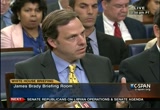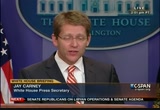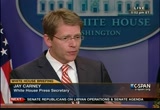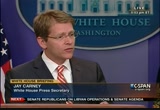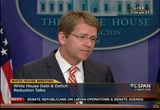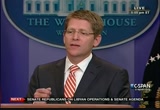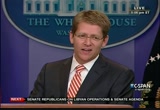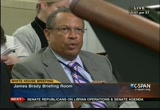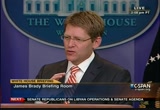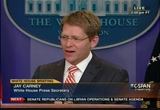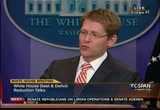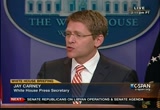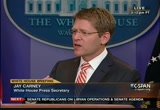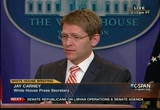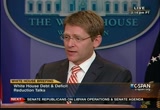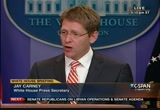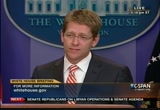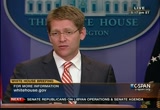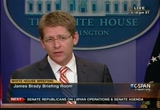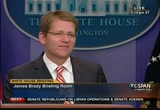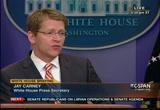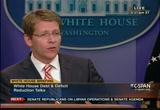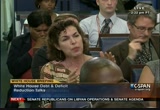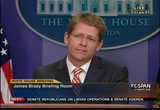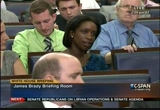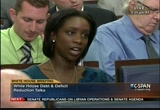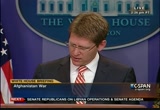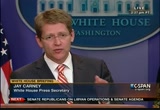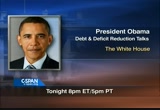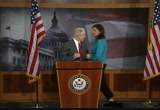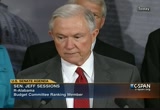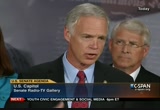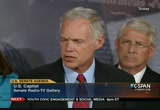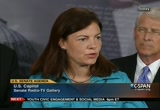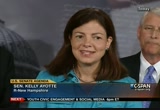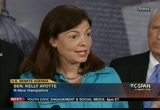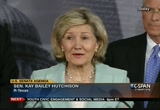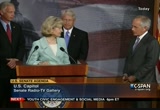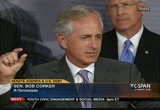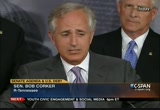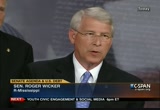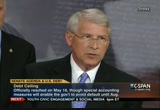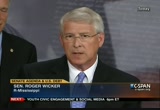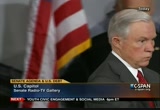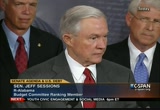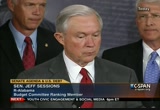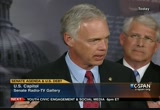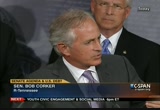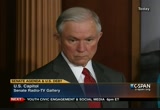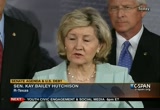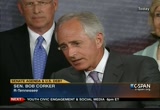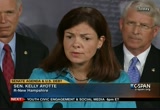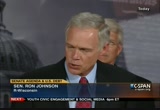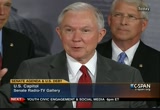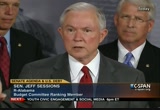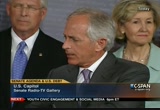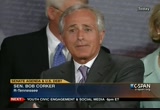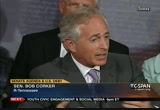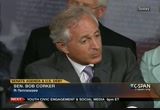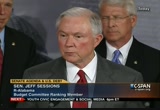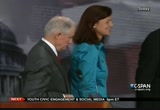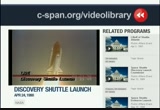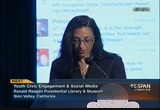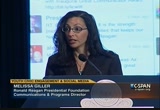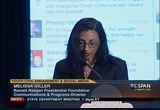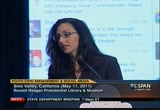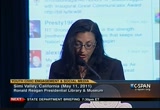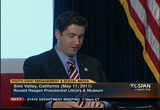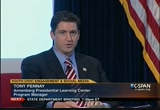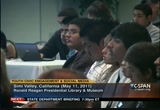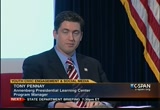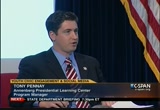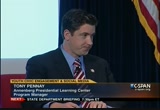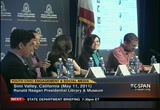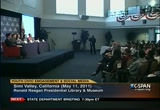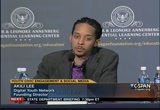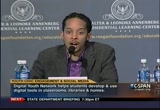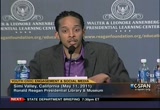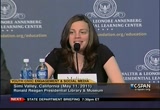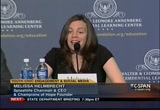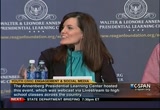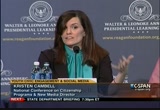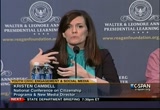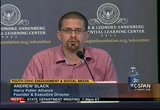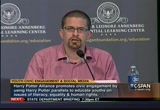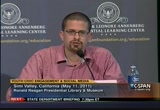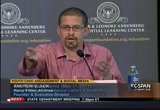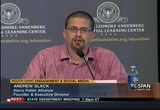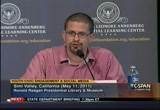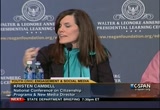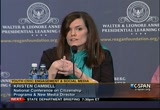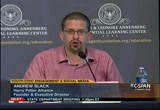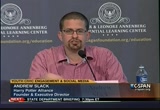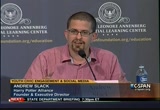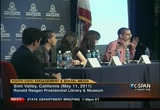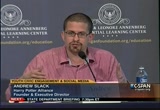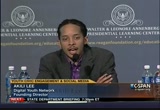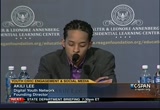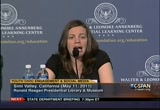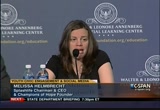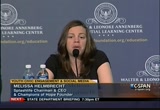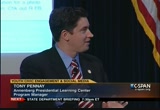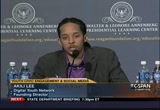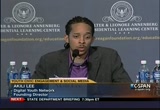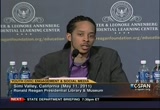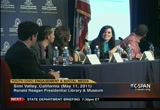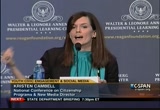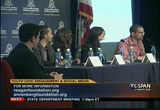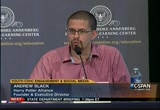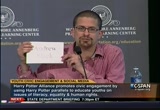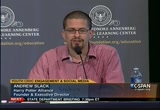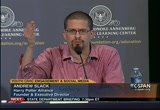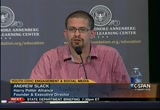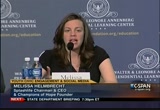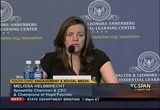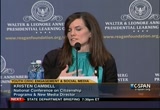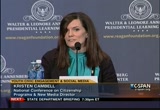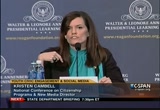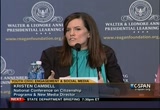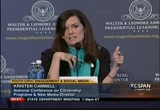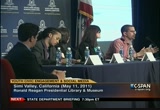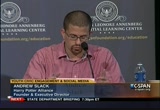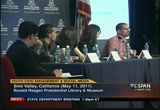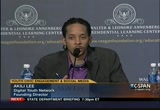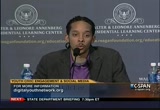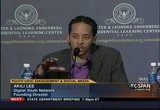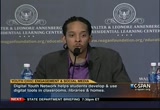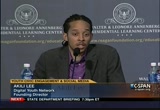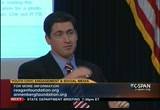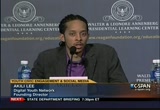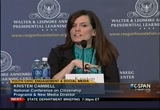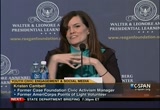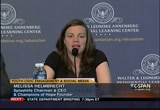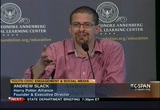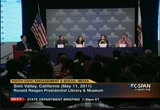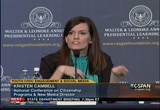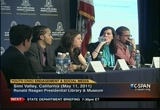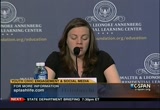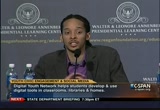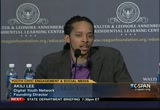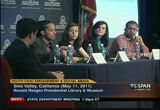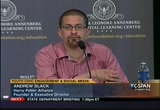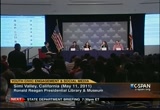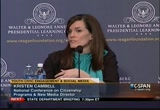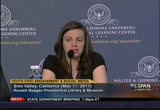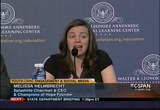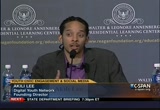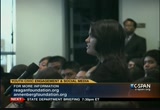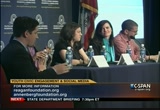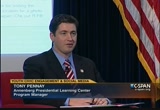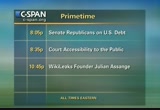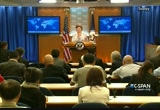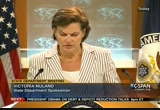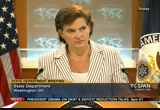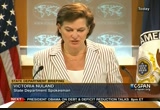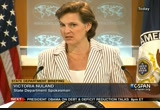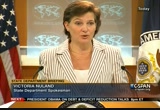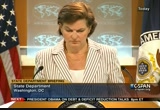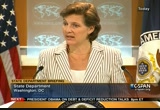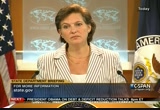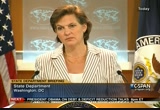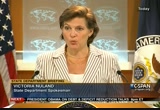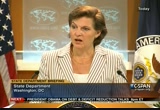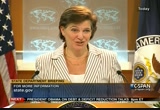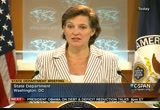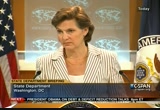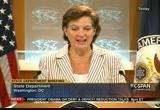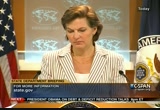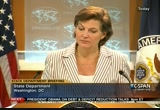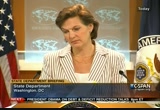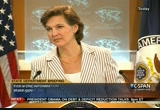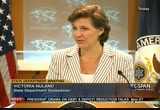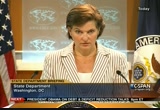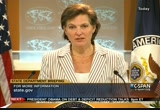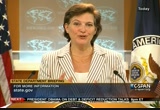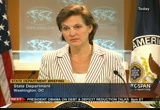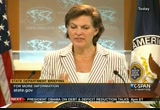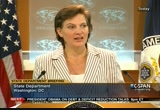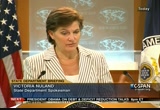tv U.S. House of Representatives CSPAN July 5, 2011 5:00pm-8:00pm EDT
5:00 pm
furious program are now showing up in the united states attached to criminal transactions, the abc station in phoenix last week reported on several of these weapons from fast and furious turning up, how come we know so little, the public knows so little about this program and what is the administration doing to get to the bottom of these weapons? which are now showing up in crimes in the united states? >> i think i think the there is an investigation going on and i captain comment on this because there is an investigation going on. >> would the head be permitted to go to capitol hill to testify? my understanding is that he has not been allowed by the administration to go there and explain what's going on. >> i have to refer you to justice on that. i don't have any information on that. >> is that not something you guys are worried comb? >> i think it's being investigated for a reason. and obviously, it's a matter of
5:01 pm
concern and that's why there is an investigation. but it would be a mistake for me to comment further on or characterize further what happened or, you know, how to rate our unhappiness about it from here. i have to refer you to the justice department for that. >> lastly, i mean we have heard at times when the president was upset about something, plug the hole is one that was shared explicitly to everyone in this room by the white house. is the president upset about that? this is a government operation where the mexicans are upset? >> you can assume that the president takes this very seriously. and there is an investigation going and to comment on people's jobs is inappropriate.
5:02 pm
the president takes it very seriously. he made clear when -- during the mexican state visit and he found out about it through news reports and he takes it very seriously. >> going back to that question, you aren't able to reach a long-term deal, what other options are on the table or do you have any options on the table? is the president essentially saying, only a long-term option here? >> the president believes that we have to think big and act big, because as i mentioned before, there have been events and decisions that have led us to this point and they include the terrible recession, the worst since the great depression we went through. the fact that because congress wouldn't act, he apointed the commission and they delivered a report. we have the outside report.
5:03 pm
and we have the president's framework he put forward and the republican budget that passed the house, all of which describe a problem and a solution in generally the same terms. the big exception is three to one, they propose solutions that demand a balanced approach which the president supports. this is not the kind of situation that comes around very frequently and the president believes that it is worth the inevitable political difficulty making tough choices creates to get this done for the american people, for the american economy. so he does not share the view, does not believe it is wise to pursue a short-term solution that essentially would be kicking the can down the road and not at all addressing or solving the problem. the problem is there in front of us. we know what it would take to solve it or to seriously address
5:04 pm
it and we should move forward with that. >> when he says he does president believe it's wise or does president share the view, doesn't mean he wouldn't embrace it? >> the president is clear that he does not support going in that direction and we have been clear prior to that. i'm not going to negotiate sort of what happens if from here. and you know, this is the process that will continue i think fairly intensively in the coming days and weeks and hopefully it will fult in a broad agreement on significant deficit reduction that then also allows the congress to move forward with making sure that the united states of america does not for the first time in its history default on its ooblings obligations. >> another question on the minnesota shutdown. is that something the president has been watching? >> i haven't had a conversation with him on that. i don't know. >> has the white house seen any
5:05 pm
sign that republicans are willing to bend on revenues. the president suggested there has been more progress going on recently. any signs they are thinking about bending on revenue? >> without getting into the details about what is or isn't in a possible agreement because a lot of work has to be done and a lot of tough choices need to be remained. >> how it addresses the need to reduce spending in the tax code
5:06 pm
he with with we believe it is significant enough for the leaders to come here on thursday and anticipate pretty intense negotiations going forward. >> 14 amendment question, is that being studied by white house lawyers? >> i'm not aware of. people read the newspaper. >> have you heard the president talk about it? >> no. >> because some republicans are willing to forego raising the debt ceiling and no democratsr they hold the cards and you don't, what's wrong with that logic? we tr talking about doing something that has never happened in the history of this history. i will spare you reading again the letter from president reagan, reading again the letter
5:07 pm
from then treasury secretary jim baker about the absolute necessity that the united states fulfill its obligation and pay its debts. this is not a vote to increase spending but to pay the bills that congress ran up. and the fact that there are some members who seem to think that's not an important obligation to fulfill, doesn't make it right. >> but they are willing apparently to go there and you're not. >> like saying you are willing to put a gun to your head and pull the trigger, is that wise? i don't know. it's not just you who would suffer, but the entire country and the global economy. >> "weekly standard" seventh quarrel report, calculated that the jobs paid for cost by its calculation $278,000 each if you use the large number of jobs created, $178,000 a job. what's wrong with the math
5:08 pm
there? >> they did this analysis and you should view it through that, i suppose. the study, the report is based on false analysis. the recovery act was meant to do much more than create and save jobs but to invest in infrastructure and industries, and investment in the economic future of america's working families. the recovery act 110 million working families received a tax cut, over 110,000 small businesses received capital until small business loans and 75,000 projects were start d nationwide to improve our infrastructure, and spur economic local development. you can do a lot of creative math and come up with an outcome that supports a particular
5:09 pm
editorial point of view. the nonpartisan congressional budget office has confirmed that the recovery act delivered as promised, lowering the unemployment rate by 2%, boosting the gfment d.p. and creating and saving 3. million jobs. we concur with that nonpartisan analysis. >> some of these meetings that the president referred to over the weekend? >> no. >> there were meetings with congressional leaders. >> i have made clear that there are conversations, meetings that will take place during this process as they do in the normal course of events. during this process i'm not going to read out and the points that the president was making is that we have been working this continually, daily through the weekend, through the weeks gone by and meetings and conversations continued over the weekend. >> can you square this issue,
5:10 pm
the president saying, i can't deal with a short-term deal but you have two weeks to get it done? all of these issues with, i believe you are inviting 70 people to this meeting on -- seven people to the meeting on thursday? >> there are conversations going on, this meeting is part of a process that has been ongoing for a number of weeks now and months even. and yes, we are on a tight deadline, but we have traversed a lot of terrain. we aren't there yet, but there has been significant progress already. >> there is a big deal but can't get it in two weeks but will get it in six weeks. >> to stand here and say, let's kick the can down the road because we need another six months is crazy, because we know
5:11 pm
-- this issue didn't drop on everybody's desk last week or this week. people have been studying and proposing different solutions for a long time. you have reported on them in detail. and we know what the parameters of a solution look like and we know the tradeoffs that are involved that would be required to reach a compromise, a compromise that by definition requires each side republicans and democrats to get outside their comfort zones and accept cuts they don't like, whether it's in nondefense discretionary, entitlement spending or in the tax code. people are going to have to accept something less than the ideal. the ideal will never become law whether you are a conservative house republican or liberal senate democrat or president of the united states. you will not get 100% of what you want. the system doesn't work that
5:12 pm
way. why have republicans indicated they are willing to cut a deal. >> i'm not willing to get into the conversations that have taken place over the days and weeks that have gone by. in the end, anything that is agreed upon has to be passed by congress. leaders play an important role in making that happen. meeting with leaders is an important part of the process. >> are you going to meet with these other folks? >> we may or may not. the point is that the meeting that the president announced today is part of the process. announced his process to get to something big that the american people expect us to get. you know this. you get out there and report and find out when you get out there and look at it in the polling data, they don't say i draw this
5:13 pm
in the sand. they want to get something done that's sensible, that spreads the sacrifice and spreads the prosperity that hopefully a significant deal will help produce. so with that in mind, i think the president is willing to make the hard choices and he expects others to do the same. >> the president sounded much more positive about getting a deal than he did less than a week ago. is that a fair assessment and why does he sound more positive? >> i think we have always said -- you guys can analyze his tone and pars his language, but we have for a long time now pleased with the progress that has been made in the negotiations made thus far, concerned about the urgency that everyone needs to feel to get to a final agreement and optimistic that a final
5:14 pm
agreement can be reached. those notions were expressed by the president last week at his press conference and then again this afternoon. >> well, i guess -- >> we we closer to a deal than we have been last week? >> there is progress every step of the way. not every step has been a big step in the right direction or produced a big step in the right direction, but there has been progress steadily throughout this process. >> including a lot in the last week? >> i think the president referenced the fact that we have had conversations and meetings, but the -- personally, right? he said he has had personal discussions. >> that's what he said. the point being that we're not there yet and he made that clear at the top of his statement. we have some difficult terrain
5:15 pm
yet to cross, but a deal is possible. it's within reach if people are willing to basically take the risk to get something big done. yes, sir. >> your answer to chip means that the white house does not assert the white house has got the authority to circumvent the 14th amendment and circumvent the debt limit. >> you are reading much too much. i'm not aware of any analysis being done by lawyers here and i have not heard the president discuss it. >> is the administration offering iraq to keep troops there after the end of the year? >> as i think i have said before, our plan is to fulfill our obligations with the status of forces agreement with the iraqi agreement which requires us to withdraw all u.s. forces by the end of this calendar year.
5:16 pm
we are on track to do that. we have said we would consider a request by the iraqi government for some sort of sustained presence by u.s. troops. that request has not been made. we are on track to withdraw all forces down to zero by december 31 of this year. >> any plans for the president to attend the launch or return to the last shuttle launch at the end of the week? >> i would love to say and i would love to go with him but i have no set schedule. >> short-term deficit mebs, is that would it would take? >> i'm not going to issue a veto threat from here. his focus right now is on working with members of congress, leaders and other important members to try and get something significant done. >> toes the president want
5:17 pm
geithner to work and stay until the election? >> geithner said he will be here for the foreseeable future. secretary geithner has been a valuable member of the president's economic team and he depends on him every day and will for the foreseeable future. >> do you see this is the beginning of the marathon all-night session that we saw with the 2011 budget negotiations? >> we'll see what happens on thursday. we did not suggest to members that they bring their pillows and blankets, so i wouldn't expect that. >> do you expect intense negotiations going forward and do you expect that will be daily? >> i don't want to announce the schedule and have had meetings with different folks on a daily basis, but i don't have a schedule in terms of the president's engagement to announce to you today from here. >> just to be clear, have all
5:18 pm
the parties said yes they will be here on thursday? >> yes. >> be here or blair house? >> i think it will be here at the white house. >> what's the thinking of doing it here rather than accepting invitations from the hill? >> the president believes it's important to get leaders from both houses, both parties together as we approach the deadline and as i said last week, he has met with conferences and caucuses from both houses and both houses as well as having members with other leaders in the past. he think this is the right time for this sort of meeting. >> just to follow up on something mark asked, is there an offer on the table from the administration to the karzai government to keep 10,000 troops in iraq? >> you mean the maliki government? i don't believe -- i don't have
5:19 pm
any information to suggest that were true. we are waiting -- awaiting to see whether or not the iraqi government makes a request of us and that has not happened. we are obviously now in july. we are drawing down to zero. we are on schedule to draw down to zero by december 31 in keeping with our agreement with the iraqi government and we will continue doing that as planned. so there is a certain amount of -- not sensitivity, but only so much time here available for the iraqi government to make such a request. if they do, we'll consider it. otherwise, we are keeping on schedule. >> how much time -- >> i would refer you to the defense department, because that has to deal with the logistics of drawing down forces principally. but i know it's not an endless amount of time. >> could i clarify the debt ceiling achievement that the
5:20 pm
president would like. the estimate is that if the debt ceiling goes up 2.4, it would take everyone through the end of 2012. is that what the president is shooting at? >> my understandings is that he was referring to -- we have seen reports of people talking about very short-term agreements to allow for six more months of negotiations. that is not a proposition the president supports. but i don't want to say that's unacceptable and something else is acceptable. the president believes that we should be aiming higher, that if we have the political will, collectively, democrats and republicans to do the right thin by the american people, that we can actually achieve a significant reduction deal in the trillions that is balanced, that sends a signal around the globe that we are getting our fiscal house in order and will
5:21 pm
produce a boost of confidence in the american economy that we think will continue to allow it to grow and create jobs. >> he is not coming to the table trying to delink the two from the republicans, right? >> i think we have said, we have acknowledged, while we do not believe that something as serious as the need for the united states to fulfill its obligations and not default on its obligations should be link todd any vote that may or may not happen. we accept the fact that some members insist we get a deficit reduction deal in tandem with with the vote to raise the debt ceiling. we believe the debt ceiling will be raised and the united states will not default on its obligations. we take the leaders at their word that they thill -- they will fulfill their obligations. we are pursuing a significant
5:22 pm
reduction deal currently. >> if the two things remain linked and the numbers they are shooting for is going to be linked to however long that debt ceiling -- >> how much they raise the debt ceiling is for congress to decide. we believe the deal can be significant, it can be in the trillions and size and scope that has been agreed upon broadly speaking by all the significant players in this discussion. so, again, that's for congress to decide the size of -- how high the ceiling is raised, not by us and for them to decide whether to link that. we don't do that. >> can you weigh in on that? >> i don't want to foreshadow what he may or may not say. but we don't view it that way. >> what prevented the president saying to them exactly what he
5:23 pm
said today and things might have been a week faster? >> what does that mean exactly? >> you could have come to me. >> again -- is the president's not engaged talking point because the president has met with the minority leader of the senate, house speaker, relevant members, vice president. >> what is the difference between last week and today? >> i'm going to move on. we are progressing down the road towards what we believe could be a significant achievement for the american people if everyone, democrats and republicans, are willing to accept something less than their absoluteist position. >> if you are asked to keep more troops in iraq past december 31, how will you pay for that? >> i will have to bump that to the defense department.
5:24 pm
i don't have a specific answer for you on that. wer as of now, on track to withdraw all of the u.s. forces in iraq by the end of this year as dictated by the agreement we have with the iraqi government and as promised by the president of the united states. so we have said for a long time now, if the iraqi government asks us to maintain some level of troops beyond that end of the year deadline, we would consider it. that doesn't necessarily mean we would do it, we would just consider it. and i really don't have any more information on that possible outcome because again we haven't gotten a request. >> follow-up on an earlier question. there were meetings that senator mcconnell requested and you suggested that a meeting like that isn't worth having? >> i understand that that phrase
5:25 pm
has been slightly taken out of context and used for talking-point purposes. my point is as described by us, the president was to go here, articulated an absoluteist position that we already know. we heard it and understand that. we are beyond that, where we believe we have to to do -- and the president has done, a listening session with senate republicans and it was important this week because of the urgency of the matter to move forward with the meeting with the leaders he has called for thursday. >> do you believe it will be the same type of meeting? >> i'm not sure -- >> are you saying that the meeting that the democrats and republicans requested -- >> i'm not sure what story you are trying to write here.
5:26 pm
who are we offending -- i think the president thinks that the meeting now that we need to have is the one he called for on thursday, most productive meeting for him to participate in and that's the one called for thursday. >> do you have anything on general allen and ambassador's meeting with the president? >> i can tell you the president met with ambassador crocker and general allen to discuss the way forward, vice president biden, secretary panetta and the president discussed implementation of our strategy in afghanistan, including consolidation and training afghan security forces, the reduction of u.s. troop levels that the president announced
5:27 pm
last month and process of transitioning lead security to the afghan government. the president thanked everyone for their service and said that he looked forward to working with them closely as they take up their important positions. >> any discussions about continuing concerns about weakening of the effort? >> not in this meeting. i believe we addressed that issue. the president feels very strongly that because of the success we have had in making progress towards achieving our goals, defeating, disrupting -- dismantle and defeat, reducing the -- stopping the momentum of the taliban and training of afghan security forces, we can begin to draw down our surge forces. 10,000 this year and 30,000 next
5:28 pm
year. >> has treasury secretary geithner told the president that he would like to leave -- >> not that i'm aware of no. >> i think he will be here for the foreseeable future. [captions copyright national cable satellite corp. 2011] [captioning performed by national captioning institute] >> in a few brief comments before the white house briefing, the president invited leaders to the white house on thursday to continue to talk about the debt and deficit. we will give you a chance to see the president's comments again at 8:00 eastern and that will be here on c-span. the senate is in session today. earlier, they came in earlier to take up legislation on libya, but they have pulled that legislation from the floor.
5:29 pm
senate leaders pulling that resolution from the floor, according to "c.q." and harry reid is saying the most important thing to focus on is the budget and looking to discuss a resolution, s. 1323, expressing support for the wealthy to quote make a more meaningful contribution to deficit reduction effort. there is a roll call vote under way now in the senate and follow that on c-span 2. as the president was speaking at the white house about an hour ago, republican leaders in the senate came out to speak to reporters about the debt and deficit discussions and about the agenda this week in the u.s. senate. they spoke to reporters and took questions for about half an hour.
5:30 pm
>> the events this afternoon were very, very significant. the senate has sent a message to the leadership that we expect in this recess period, that we do real work on the financial condition of our country that includes budget issues and includes the debt limit, the debt ceiling. those matters are of extreme importance for america and we should be focusing on that. 46 republican senators wrote prior to the memorial day recess and we said we should not recess then until we have done something about the debt situation our country has faced. and so the issue is joined again before the july 4 recess. the president knew well what was going to happen. i think the majority leader
5:31 pm
decided he was not going to have a vote on recess and the president joined in to that. i would like to say how much i appreciate the new members of the senate who have brought passion, enthusiasm and commitment to this issue, unlike what i have seen in some time. so i'd just like to recognize at this time, senator johnson and senator kelly ayotte have have who have provided i am pet tuesday to what led to this significant event today. >> i have been following your lead. senator sessions has been out there talking about how really broken the senate is when it comes to the budget. let's face it, the united states senate has not passed a budget in over two years and i understood how broken washington is and i understand how -- the
5:32 pm
senate is fiddling while america goes bankrupt. and so last week, i stood up on tuesday and said this has got to stop. and until the senate gets serious about addressing the number one problem facing this nation, i was going to withhold my consent. we kind of passed through the nominations bill. but then senator reid brought up the libyan resolution and i objected, because as important an issue as that is, it simply does not address the fact that we are bankrupting this nation. think about the fact that the united states senate has not passed a budget in two years. i have been in business for 34 years and had to produce budgets on time and had people produce budgets for me on time. it is unthinkable in business to miss one of those deadlines. we are talking about the united states government. we are talking about the united states of government. and thr united states senate can't pass a budget on time
5:33 pm
while america is going bankrupt. so this week, because of senator session's leadership of not going out on recess, we came back, but to do what? we have defeated this vote. and i got to thank all my colleagues here for supporting me in my efforts last week to call up my republican colleagues. the fact of the matter is, republican colleagues in the senate were united and we have to turn our attention -- we are back here and we need to address some real solutions. i thank everyone for participating and turn it over to kelly hole worked hard. >> i want to thank senator johnson for his leadership and standing up last week and saying, no, we should not go on recess. we should stay here and address the fiscal crisis that our
5:34 pm
country faces right now and i want to thank my other colleagues who are standing here with me today. i thank senator sessions, senator corker and senator corker and senator hutchison who have said while libya is an important issue, right before us right now is the fiscal crisis that we need to address right now. and that's why we're back and that's why we're not on recess. and i want to say i'm very disappointed that in pulling the libya vote because senator reid did not have the votes because republicans said we are going to deal right now with this fiscal crisis and make sure we get our fiscal house in order in washington, he brought forward this nonbinding sense of the senate resolution. and we're here to work on real
5:35 pm
legislation that is going to address this fiscal crisis. republicans have proposed a balanced budget amendment. senator corker, who i know will speak, has proposed a cap act to cap spending, to bring us on a responsible trajectory going forward in terms of how much money we are spending. and we should be bringing a real budget resolution to the floor. unfortunately, this latest sense of senate is really a political stunt on behalf of the majority leader. we're done with political stupts. what we need is real leadership and real leadership means we are ready to roll up our sleeves and put together legislation that is going to reduce spending, going to bring us to a balanced budget and so that all of us can make sure we are leading for our country. we are leading for the next generation, my children, your children, a better country and
5:36 pm
preserving the greatest country in the world and that's what this is all about. we are ready to roll up our sleeves and get to work. i would like to introduce senator kay bailey hutchison from texas and thank her for her leadership on bringing us together on this important vote. >> let me just say it was the spirit of so many in our conference who said that there is something wrong with us coming back, not keeping the commitments that we have made in our home states for a purpose and that purpose is to deal with the budget crisis that is looming in this country and the debt ceiling that is upon us. and standing with me, jeff sessions who is the ranking member on the budget committee, who is standing firm, that we should have a budget. the first thing we have to do to solve this problem is to put out a budget resolution.
5:37 pm
then we'll know how much spending we need to cut and we'll know where the spending priorities need to be. that's the first step and jeff sessions is ready to go and we ask that a budget resolution comes to the floor so we can debate it. we don't disagree on the goal, but we doll disagree on the spending cuts that are necessary and priorities. let's debate it and get out there and have amendments. senator corker has come up with a real plan to cap spending at a level that is associated with the gross domestic product and that's the kind of legislation we ought to be looking at to solve the big problem before us. so senator corker, thank you for everything you have made and our conference is completely united but this is the priority and we need to get on it.
5:38 pm
>> i'm thrilled to be here with my colleagues, who have done such a great job. we did a vote tally this morning as to where we were and momentum continued the bill that began at the end of last week and i'm glad senator reed has pulled the libya vote. ron johnson, as was mentioned, began this last week and kelly and jeff and kay bailey hutchison and roger wicker have been involved in getting where we are. i haven't done the math. i have been in business for 33 years. you made me do the math just because you mentioned it, but one of the things that's frustrating in being in a place like the united states senate, typically when you have an ox in the ditch in business you focus on that.
5:39 pm
you don't go off on a tangent that is unrelated to the issue at hand. as ron mentioned, congress is settling while america has this huge problem. to take up libya, which is an important topic, but all of us know no matter what we did on libya wasn't going to affect what happened in libya. the house has already voted down this recommendation. again, it was a filler. and i know what we have said it and did it in a unified way and i might add some republican senators had to defer on an issue on an issue they felt was important, and agree consolidate around the area that, as has been said by our national security advisers, the number one threat to our country is the debt issue. i'm glad we were able to do this and i hope we can focus on
5:40 pm
things that has something to do with the budget. 797 days since we have had a budget in the senate. haven't had one brought to the floor this year. i hope we will focus on the most important national security threat, debt, over the next short period of time. we have a debt ceiling vote that has to occur according to the administration by august 2. that may or may not be the right date, but that's what we need to focus on and i thank my colleagues for focusing on short time. >> roger wicker, mississippi. let me make sure everyone understands why we're here. we're here because had the vote at 5:00 been taken, there's no question that the majority leader would have been defeated in his effort to move off of the
5:41 pm
subject of the debt and on to another subject. to me, this represents a significant legislative victory for those of us who agree with the outcould going chairman of the joint chiefs of staff on our number one threat is the debt and we ought to be talking about that. there is one reason and one reason early that the senate is in session today, july 5, 2011 and this week and it's because we have been challenged to come back here and deal head with with the pressing issue facing our country and that's the debt, annual deficit and what are we going to deal with this. last week the republican leader asked him to come and meet with the president's lunch. >> they said it was not a
5:42 pm
conversation worth having. senator mcconnell renewed that invitation today in addressing his fellow senators on the floor. and i would renew that. i think it would be valuable if the president did come and speak to us. also there is the idea of actually following the budget law, which requires the budget committee under the leadership of the budget chairman and majority leader to bring a resolution on the floor of the senate for debate or discussion and for amendment and for passage or defeat. and so i'm calling on senator sessions counterpart, the budget chairman to address this issue that brings us back to washington, d.c., this week by convening the committee, reporting out a budget resolution and having us deal with it substantively. and finally, and this is the
5:43 pm
hope of many of us that the house of representatives will send us substantive budget legislation to prove it can be passed in the house, the cap act that senator corker has been so trumental in. balanced budget, constitutional amendment. send them out to the women can people, particularly in the case of the amendment for ratification. give us substantive victories that we can show the american people and show we are serious and willing to work on it and get results. con -- congratulations to my colleagues and i turn it over to our ranking member for any qunch and a you may have. >> focusing -- what can be done
5:44 pm
on the debt limit? >> there's a lot involved in raising the debt limit. the president has with his reckless spending, the three consecutive trillion deficits, $1.3 trillion, $1.2 trillion and $1.5 trillion, we have hit the debt ceiling sooner than expected. the issue goes beyond raising the debt ceiling and how do we change the trajectory, but there is a constitutional amendment. it failed by one vote when i came here in 1997. obviously showed had that path
5:45 pm
then we wouldn't be in ht hole we are in today. there are a lot of issues. i think we should begin discussion and hearings on balanced budget amendments. they say we have to have tax increases. let's see what they are and have the finance committee analyze them. how much will they actually raise. how much spending and where it needs to be cut. this is the work of the congress and i have to say any objective observer would be concerned for the historic role of congress when you consider the settlement that occurred last december, the c.r. settlement that were rushed through, even the health care bill and we haven't fully engaged in the kind of process that makes for better legislation and for public
5:46 pm
acceptance. >> one of the main reasons i stepped up to the plate last week and started to object was because of the process. a limited number of individuals to close doors far from the view of the american public, is that how we are going to decide the financial fate of america? i don't think so. i do not believe that's what they envisioned. we are calling republicans and saying bring your proposals forward, where is your plan? we realize you don't like our plan and demagogging our plan, but where is your plan? let's debate it and discuss it and let the american see that. that, in the end and from my standpoint, i think the solution is a two-step process. we have to provide those caps. we have to provide that overall diss call discipline and that is
5:47 pm
a constitutional amendment and what is wrong with passing a constitutional amendment and sending it to the american people. i think the american people want that fiscal discipline. our democratic members in congress, passed a a balance budget amendment. >> the fact is, i think people understand at this point that republicans are not going to approve a debt ceiling increase without dramatic changes in the character of spending. they are related. the very things that were laid out, all of these are now related because women don't want to see things continue as they are. you are right it may team like in isolation but there are a number of process issues that can be dealt with this week that would add to getting an
5:48 pm
agreement on the debt ceiling vote. not just the cap act, we have members that offered a two-year budgeting cycle. there are all kinds of things, freeze in federal spending, number of employees, social security, there are all kinds of things that have been produced that if agreed to would be very much complementary. that's why i spore it. >> i don't understand why you keep talking about how much you want to cut spending and how important it is, but when you talk about cutting spending, you talk about balance budget amendment and cap act which you don't have -- and budget resolution. why not actually congresswoman up with real spending cuts like
5:49 pm
actual changes to programs you start talking about procedural things. who cares. why don't you say what you are going to cut? >> those are the things that lead up to a balanced budget. i have put out a social security plan. it doesn't increase taxes and doesn't cut core benefits. that should be on the table for any long-term fix. maybe people don't like this or that part of it, but we have to get it out there. >> when you first stood up, you have talked about other stuff. >> i put the bill in. it is on the record. i have had press conferences and spoken with it and been to the heritage foundation and talked to the experts about it. i have a real proposal on social security and it will close the
5:50 pm
75-year gap without a tax increase and without any cuts to core benefits. we have to have a discussion, a process. a budget resolution or balanced budget amendment or an agreement should include that. and give us the process and we have ideas. >> the budget, i think we all did mention, the budget does lay out what spending is going to be over the future. something like the cap act is what it does is look those in -- ok -- huh? [inaudible question] will have a vote for a budget possibly but came to the floor. here we are in july, he even haven't had a budget come out of committee and we are bumping up against the debt ceiling. all of these things do go hand in hand and the budget lays out
5:51 pm
cuts, something like the cap act locks those in and don't change. they are relevant and pertinent to what we are doing here today. >> the notion of not having a budget, that is very significant. look at the diagram ave we went through on the continuing resolutions. number two, there is not a business in this country that doesn't lay out to have a plan on what they are coming in and what they're spending and we keep hardshipping on it. it says in the law april 1, april 15 to put the budget together and meeting the deadline and working up your sleeves and prioritize as to where you are going to send your dollars. i'm the newest member of the budget committee and i captain
5:52 pm
describe my frustration of not being able to do the real work of that committee, and i wanted to be on that. and keeping this can down the road is completely irresponsible. >> i would like to provide ar direct answer, but the fact of the matter is, two-step process, no one wants to cut spending, if you are in a budgetary process, no one wants to stop sending. i think you have to enforce the discipline first. you have to have those companies. you have to have a constitutional amendment by forcing but making americans realize that we have to prioritize spending. let's see, you throw the process and saw the demagogry against the ryan budget. that's what happens when you throw out the spending cuts
5:53 pm
without the spending caps that we need. you need to put the diss plain in face. i believe that the only way long-term we actually face this problem, because i don't think you'll have the political will here to actually do what is necessary in terms of structural reforms on these programs. that is me speaking for myself. >> can you and senator sessions say what you are going to do with the reed resolution? is this going to more forward and might offer an alternative to it? >> well, as has been said, it's the sense of the senate. we were supposed to have legislation in place by august 2 raising the debt limits. and that has to be real numbers.
5:54 pm
so i guess committee can say we are beginning to talk about something, but rather mathetic -- pathetic response. and i would note, the republican house produced a pen dealt with the problems we face new york city democratic senate has said they have one and they said they have a bigot. i would like to see it. would you like to see it? >> they pass it with a simple majority. so republicans pass budgets with 51 senators. this is something they could do. and the remarkable thing is that they are unwilling to lay out the kind of numbers it takes to change.
5:55 pm
$3 billion on the airplane savings they say, commercial aircraft. the president's budget over 10 years, scored by the congressional budget office will increase the debt of american $13 trillion. this is a demagogging thing to say you have to pass a $3 trillion deal, as if this has any significant considering the serious. >> what jeff said is correct. this is only a resolution. it would be interesting if they brought forth real taxes. we might actually debate that and i wouldn't support what they brought forth. it's the sense of the congress. we have lots of members on our side of the aisle that want to
5:56 pm
debate. this is something they have spent a lot of time on. lot of our folks have traveled to libya and we have all met leers of the transitional government but they want to put that aside. you all know there's nothing yet prepared lower than things we have offered to deal with those issues. but i think if the majority knows that we are willing to stick together and not go to any other business, any other business, other than dealing with the budget, dealing with deficits, dealing with the debt ceiling, my sense is while today, obviously we aren't going to have anything selly serious to talk about, my sense is very quickly we will have something before us that is actually real. that's the victory of what happened this evening.
5:57 pm
[inaudible question] >> you said a lot of people want to debate the libya war. when do you propose we'll get back to that? we will be in debt for a long time. when should we get to the business of weighing in on the libya business? >> we weighed in last week. most people know the resolution before us and it was defeated in the house. the thing that has been a miss noemer, the president never asked for authorization in libya. what they did say we would like a session in support a few months ago. he has tried to bypass the water powers' act. we would have said it looks uncon stall. we need to return -- uncon city cution -- unconstitutional.
5:58 pm
but we need to priority. and the most important issue as everyone has said, the most important issue to our country and also to our national security is dealing with the debt ceiling, the debt and the deficits. so i think we will get back to that, but there -- there was nothing we were going to do this week in the senate that in any way affected what was actually happening in libya. nothing. and everybody knew that. the senate might have voiced opinion, but since the house had already voted down the same resolution, nothing was going to change. you're right. we need to get back to that. in my opinion, i don't set the agenda around here. that ought to be the next item after we deal with these financial matters that are more pressing and something we can actually affect, because what we do on the floor in libya, but what we were going to do is nt
5:59 pm
going to affect the activities in the ground or air. >> one more question. >> you talked about seven-day layover periods. one of the rating agencies say they need to see progress by mid-july, maybe july 22. how can they ask for that seven-day layover given the compressed time frames? >> we have been seeing these time frames come at ut for months. we have been seeing them since the first of the year. i called for the president to lay out a historic approach to our spending in his state of the union. he did not. he talked about investments, more spending. i said you should do it in your budget. the budget made it worst and
6:00 pm
increased spending, more than the taxes and made the deficit more than had he not done anything. we are leding into the last hours of the deadline that's been set by the administration, august 2, and we have seen nothing. and i'm really flabbergasted and i don't believe republicans are to blame for this. i believe the i believe the white house, if they have a plan, ought to be proud to bring it forth. the majority leaders should be proud to bring it forth and let's begin to look at it and debate it and all the serious consequences that would accrue from not having raised the debt ceiling by august 2 which are is -- which is a serious, serious matter and hopefully we can avoid that kind of event. [captions copyright national cable satellite corp. 2011] [captioning performed by national captioning institute] >> we'll show you this again at
6:01 pm
8:05 and the president at 8:00 p.m. the debt and deficit will dominate the discussion on wednesday's "washington journal." first up, max richmond. he'll talk about the proposed cuts in medicare in order to reduce the deficit and national debt. and then pete sepp of the national taxpayers union talks about the proposed tax increases as part of that package. also, we'll hear from the visiting scholar at the bipartisan policy center, injury home powell. he'll be talking about the debt ceiling and why he believes that if it isn't raised, the government couldn't afford to meet 44% of its obligations. so the impact of a possible stalemate and failure to raise the debt ceiling, that's tomorrow, "washington journal" begins at 7:00 a.m. eastern here on c-span. >> mission control, houston. >> nasa is on schedule for the final mission of the space
6:02 pm
shuttle program this friday. with the launch of s. -- sts-135 atlantis. look back at the shuttle program and explore what's ahead for nasa. online at the c-span video library, search, watch, clip and share any time. c-span has launched a new easy to navigate website for politics and the 2012 presidential race. with the latest c-span events from the campaign trail, bio information on the candidates, twitter feeds and facebook updates from candidates and political reporters and links to c-span media partner notice early primary and caucus states. visit us at c-span.org/campaign2012. here's a discussion on civic engagement and social media from the ronald reagan president ath library in simi valley, california. this is an hour and a half.
6:03 pm
>> two years ago my then seventh grade niece gets a text from her friend and it said, omg, michael jackson is dead. now, i didn't believe it, i thought it was a hoax at the time. but we got in the car, i turned on the news and sure enough, the text was correct. and just a week and a half ago i was in my house playing with my kids and my husband was on facebook. we didn't have a tv on in the house. and he said that all of his friends were posting on facebook that osama bin laden was dead. we quickly turned on cnn and sure enough. had my husband not been on facebook, who knows how many more hours would have gone by before we heard this important story. in both instances i learned about the news not from the traditional news but from social media. yes, i confirm what was going on by turning the television news on, but that wasn't my first point of contact. what does this really mean for the way in which we engage with one another and share information? when i was asked to give today's introduction, i have to admit i immediately got
6:04 pm
nervous. not because speaking in public makes me uncomfortable, but because the topic, mixed with the audience, made me a little intimidated. why? because i would be remiss to think that i know more about social media than you. but through my job here i've definitely learned the importance and the reach of social media. whether it be facebook, twitter, youtube, in getting out our message and the message of ronald reagan and in pulling people together through the power of his words. by using current issues of the day, we can instantly send out some piece of communication which not only keeps ronald reagan relevant in today's news cycle but reaches constituents from all over the world at every age level, potentially introducing president reagan's beliefs in policies to people who may just now be learning about him. for example, following the raid on osama bin laden's compound, we immediately added a quote on our facebook and twitter pages.
6:05 pm
from ronald reagan's remarks in 1986, one day at the united states air strike against libya. we posted, terrorism is the preferred weapon of weak and evil men and as med monday birk reminded us, in order for evil to succeed, it's only necessary that good men do nothing. yesterday we demonstrated once again that doing nothing is not america's policy. it's not america's way. that quote was read, retweeted rerks posted and commented on by thousands of people who, without the advent of social media, we would not have been able to reach, at least not as quickly or as widespread. social media best becomes the opportunity to speak with people from all over the world, that you might not have had the opportunity to speak with otherwise in an instantaneous approach. to spread your message, to share your cause, to rally the troops. during president reagan's farewell address to the nation,
6:06 pm
he reflected back on the things he had done and the things he had said and he remarked, and in all the time i won a nick name, the great communicator. but i never thought it was my style or the words i used that made a difference, it was the content. i wasn't a great communicator, but i communicated great things. obviously social media as it is understood today didn't exist when president reagan was president. his ideas or his content were communicated through television, radio, newspaper, public speeches. we can only guess now how his messages and causes would have been spread differently if facebook and twitter were around. that's why it's our job that the reagan foundation to communicate his ideas through social media, to help continue his legacy and share his principles today and far into the future. as ronald reagan once said, let
6:07 pm
be you are -- us be sure that those who come after us will say of us in our time that in our time we did everything that could be done. thank you. >> excellent. thank you very much. before we get started today i wanted to acknowledge a few of our guests and thank them for coming. mr. stanley mantooth who is the ventura county superintentent of schools. thank you for coming. we also have with us today marty tipness-murphy who is a member of our national advisory council and does some amazing work with the organization facing history and ourselves. and also her colleague, also from facing history and ourselves, ms. mary hendra. thank you for coming. and we are also delighted to have christian linke who is the program director at thers a lynn program. whose work focuses on youth civic engagement.
6:08 pm
he's also responsible for sponsoring the attendance of mr. kenny and his students who are tweeting and face book g and giving -- facebooking and giving commentary as we go through the program today. and hello to our live audience of students and people who are watching on the internet. thank you for spending about 90 minutes of your time today listening in on this very important conversation. at the end of the last millennium, "time" life magazine selected a printing press as the single most important invention of the previous thousand years. it beat out inventions such as the automobile, vaccines, telephones, airplanes, refrigerators and even the personal computer. why? why is that something that helps mass produce books is considered more important than cars which changed the way that industry and transportation work? why is it that the printing press is more important than vaccines which have saved countless lives across the globe? why is it more important than the computer which has changed
6:09 pm
the way we learn, the way we work and the way we communicate with one another? why? because knowledge is power. books were the first item in the listry of mankind to be mass produced. what once took countless hours to be copied can be printed thousands of times at a fairly rapid rate. the wide availability of printed matter led to a rise in literacy rates. no longer did you have to be from a wealthy family or the son of a nobleman or a member of the clergy to obtain a manuscript and be able to read. reading and books and even more important than the books, the ideas within the books, were suddenly available to large segments of the population. and what did this mean? well, it meant some pretty drastic changes in the way the world worked. in religion, the church clergy were no longer the only ones able to read and interpret the bible. this led to the reformation of the catholic church and drastic changes in the way christianity
6:10 pm
and religion worked. in the united states printing enabled men like benjamin franklin to rice to fame and influence and even later in his life ben franklin always referred to himself as a printer. and the ideas that led to the american revolution, the ideas were spread through the use of the printing press. it was the original form of mass communication. as history moved forward, mass communication einvolved, it became quicker, more efficient and reached a larger audience. in the 1930's and 1940's, president roosevelt used a radio to effectively communicate with an entire country during his fireside chats during the depression and world war ii. in the 1960's john f. kennedy used his good looks, his charisma and the power of television to help right a way for the presidency. and ronald reagan, the namesake of this library and museum, used mass communication first to rise to prominence as a radio announcer and movie star
6:11 pm
and then as president heuality lidse -- utilized mass communication to console the nation after the explosion of the challenger space shuttle to denounce the evils of oppressive communist regimes, to help bring down the berlin wall and to restore america's confidence in itself. and now we have the next iteration of mass communication in the form of social media. it's the quickest, cheapest, most efficient way to share information with the large audience. sites like facebook, youtube, twitter, they've taken the power of the printing press and placed it in the hands of anyone who has access to it a computer or a smart phone. as recently as a decade ago, if i told you that you could have a piece of equipment the size of a candy bar, put it in your pocket and be able to communicate with anyone, anywhere in the world in a second, would you have look at me like i was crazey. this was the things of science fiction. now it's an everyday reality. a social media evolves, we see the further democraticization
6:12 pm
of mass communication. you don't have to go through a publisher to share your thought, ideas, writings, pictures, videos with the world. you can blog, tweet, upload to youtube. and it will be there in seconds. it's faster and more efficient than ever before to share news and information. it's easier than ever before for companies, organizations, celebrities and politicians to communicate with and inspire their followers. encouraging them to buy goods, volunteer their services and organize in an effort to bring about powerful change in their communities and the world. what does that mean for you? the students and educators in our audience today? what is the ease and scale of social media mean? it means that you have a tremendous amount of power. it means that you have the power to share your ideas, to influence others, to connect with those who share your passions, to engage with those who think differently than you do and to affect positive change. president eisenhower, one of president reagan's great friends and mentors, once said that there's nothing wrong with
6:13 pm
america that the faith, love of freedom, intelligence and energy of her citizens cannot cure. and social media offers an opportunity for citizens both in america and abroad to join together in pursuit of making their communities better. today's panel will examine the connections between being civically engaged and the use of social and digital meetia. with the specific focus on the ways in which young people, like the students we have in the audience today, are able to leverage their use of social media as tools to promote civic engagement. our panelists today come to us from a diverse group of organizations. at the far end of the table, from the harry potter alliance, a group that uses the mythology of the harry potter stories to inspire good deed as i cross the country, we have founder and executive director, mr. andrew slack. >> from the national conference on citizenship which is a congressionally chartered organization that among many other things measures the civic
6:14 pm
health of the country, we have kristen campbell who is the director of new media and programs. from splash life, a movement that works with members to volunteer, donate, exert their citizenship, produce, share content, all in exchange for points that can unlock deals on anything from textbooks to jeans, to laptops and health care, we have founder and c.e.o., melissa helmbrecht. and from the digital youth network, a group that gives students digital fools to -- tools to foster engaged citizens, we have the director of digital strategy development, mr. akili. and a couple of our panelists will be tweeting live from up on stage. they're going to be tweeting their own reaction to things like that as the panel is going on. so though the work they do is quite different, they all seek
6:15 pm
to promote civic engage. i'm looking forward to the conversation we're going to have and you're probably tired of listening to me speak, so i'm going to begin with our panelists and open up with a question that some of you who went out to classroom notice last week or so, we asked you the same quen a -- question and it's not one that's necessarily easy to answer. which is why i thought i'd put it to them because they're very smart people and probably have some good ideas. but -- so my first question, is let's give a little context, what does it mean to be civically engaged and if you could also share a bit and talk about how your organization works to promote civic engagement, so maybe i'll just start closest to me and we can move our way down and then we'll open it up. feel free to jump in and respond. >> i think this is a time that definitely probably has a different meaning to different people and i think that's ok. i think we should embrace that to some extent. for me i would define being civically engaged as being an
6:16 pm
active member of your community. however you want to define community. that can be anywhere from your school, your block, your city, your country, looking at yourself as a global citizen, but how are you staying aware of what's going around you and how are you taking an active part in determining what goes on around you? so recognizing that everything around you is essentially malble. it can be all changed and how you can leverage whatever skills you have, be it tradition alameda, leveraging social media, traditional activism, how you can leverage those skills that you guys have, whatever's unique to you, to make sure you're contributing to that reality that's around you. not being a static part of some larger group and not necessarily seeing yourself as being one who can really be a catalyst for change. i think if you are civically engaged you are remaining and making sure you're informed around what's going on around you and you're taking an active part in trying to impact some things for the better in terms of what's going on around you. the way we try to approach that
6:17 pm
with d.y.n. echoes the points that tony made in his entrow comment comments. i think we start with the literacy component. literacy doesn't necessarily sound like a great, fun thing and something that relates to technology, even in social media, but i think being informed is really the first part about being an active citizen and also being connected to this larger community, whatever -- however you decide to define community. and that transition that we've seen over the decades from printing press to radio to television and now to the internet, it really kind of redefines how we need to approach literacy. how do you communicate, how do you get information? and the same comment wes heard, that we're finding out about bin laden, michael jackson, etc., through twitter, facebook or text messaging, etc., people are interacting in very different ways. the sources of information right now are not as centralized as they have been when you had to rely on the printing press, if it was the printing press, only a certain number of folk had resources to
6:18 pm
publish books, publish newspapers. you can do anything from a tweet to a blog, your own website, your own web magazine and you can do all that with just having access to a smart phone or a computer. so from our perspective, we're saying, how can we work with young people to make sure you guys have those skills to leverage technology, understanding that there is a different landscape right now, whether it's anything dealing with technology and media, how you can be a better informed citizen and how you can also leverage those skills to kind of be a little bit more active person, to impact what's going on around you as well. >> thank you. >> i think that in terms of all of you are high school students and i remember when i was in high school that what i thought it meant to be civically
6:19 pm
engaged was to believe believe politically whatever my parents believed. so when i was in ninth grade everybody that my parents wanted to vote for and what they cared about is what i cared about. i think that part of becoming civically engaged really means making up your own mind and coming up with your own ideas for what you stand for and what you believe in. high school is really the time when you start to explore all kinds of political issues and social causes and begin to decide what it is that you believe and what you want to stand for. so i think civic engagement is different at different phases of your life. i think that as high school students the most important
6:20 pm
thing is to figure out what you're going to stand for and what you're going to believe by participating in a school debate program, by following current events, you know, it's like, running for the president of hatey, what was that all about? there's all these issues and things, to really research and use the internet to search if you hear something likewise cleff wants to run for president of hatey, to get on gool google and search it out and figure out why he wants to do that and what it means. and to develop your own independent ideas. >> thanks so much. i think i would echo a lot of what the first two panelists have said and i think we were discussing a little bit back stage how challenging this question really is because civic engagement means so many different things to so many people and it's a very personal
6:21 pm
experience in a lot of ways so it makes it really hard to talk about it and what it means and how you really promote it sometimes. but i think from my perspective and the perspective of my organization, the national conference on citizenship, i would say that i think of it more as the process of taking an active role in creating the type of community in which you want to live and work. and i think that can be done in a variety of ways. it's volunteering, it's community service, it's voting, it's contacting your congressmen, it's serving jury duty, staying connected to information and current events, doing favors for neighbors. it's a really diverse set of skills and activities and actions and behaviors that really need someone to be civically engaged. but i think it's just really more of wanting to make a contribution to the greater good and playing an active role in that is what i really think is means to be civically engaged and one of the ways that we do that as the national
6:22 pm
conference on citizenship is we measure, track and promote civic participation. in a lot of the areas that i just mentioned. but what we really want to do is understand more of the challenges in our communities and how people are engaging and connecting with each other and what sort of policy, programs, initiatives can really be developed to help people be more active participants in their communities. one of the things that i think online engagement and social media really does to help inform our work is we are 65-year-old institution, we were founded in 1946 and received our congressional charter in 1953 and what it means to be an active, informed and engaged citizen in 2011 is not the same thing that it meant in 1946. and so in a lot of ways i think that we are charged to define modern citizenship and what ways are people currently engeaged in their communities and that's where i think it's really important to have conversations like this about online engagement and civic engagement. in a lot of ways, even a lot of
6:23 pm
the surveys and metrics that we use don't capture a lot of those activities because they're so rapidly expanding and evolving. so in the same way that the census used to just ask you, you know, do you put a bumper sticker on your car or do you put a lawn sign in your yard for a politician or a candidate, now i think it's important to say, do you put a cause on facebook? do you support a political candidate through online engagement? a so a lot of the ways that people are fundamentally interacting with each other are changing because of these tools and i think it's important that the way we talk about that and the -- that we measure that and promote that can keep up with it. >> thank you. >> thanks. it's an honor to be here today. my name's andrew slack. i think the -- all through of you just answered that question. i'd almost now just skip, but i have one thing to add that's a slightly different approach to
6:24 pm
that question. real fast, who here is 14? raise your hands? 15? 16? 17? 18? 19? 44? 50? [laughter] all right. and obviously i can't see you if you're watching this on a live web cast but, hi. so, one of our members in the harry potter alliance and somebody who lived real close to me in boston, she and i became very close friends, her name's ester. she died in the end of august at the age of 16 and she did so much in terms of civic engagement. she had cancer when we met and she died and her death was something that changed me and our friendship was something that changed me a tremendous deal and got me think being a lot of things. i'm very close with her family still. and the way she lived is more
6:25 pm
important to me than the fact that she died. and i bring this up for a reason. first of all, here's a shocking statistic. 100% of babies born today are going to -- going to die. that's injustice. it's a joke. we're all going to die. and there's a little story that i heard about this, this very inspirational, and it ties into this question. i feel like i'm just rambling. there was this little boy wave in the ocean, just flopping around, being a wave, having fun, thinking about girl waves and all of a sudden he realized what's going to happen to him. he saw he's going to smash into the shore and just boom, smash into the shore and he was miserable over this. just so scared and sad and felt like his life was pointless.
6:26 pm
he just starts moping around and think he is eeg -- thinking he's so smart and how stupid the other waves are that are happy. if they only knew we were all going to die. and then he saw a little girl wave who was happy, bopping aroundering being a wave, and she looks and says, why are you so sad? he says, you don't see the truth, you don't understand what i understand. we're all moving quickly to the shore and when we do we're going to smash apart and we're going to be nothing. and we're going to die. and she smiled and looked at him sympathetically and said, you don't understand, you're not just a wave, you're a part of the ocean. and to me that is the fundamental reality as to how we want to think about civic engagement. versus nothing civically engaged. do we want to have this attitude that's all about me? if you want to, i'm cool with that. but if you want to have and at tude where it's all about you,
6:27 pm
you, you, you, you, me, me, me, me, me, it's not that happy actually. it's sort of counterintuitive. it doesn't bring that much happiness. we acknowledge as a reality that we're all united in some way, some larger way, that we're all a part of the ocean and we -- we can think about that and think about something bigger than ourselves and we can give love. in the harry potter lines, we say the weapon we have is love and those who have read harry potter, love plays a crucial role in fighting voled mortgage. and unlike monday, love is something that -- money, love is something that the more you give, the more you get. maybe money is the same thing. and there's a lot of people in our communities that need love. a lot of people sitting next to you that need love. probably if you look in the mirror you need love. if we spread that, that matters a great deal. but if we have a sophisticated understanding that the people in washington and the people in the u.n., in these -- these people and companies we pay,
6:28 pm
they make decisions that end up affecting the people that we love and people that we never met who with we would love and we can love right now and that they'll affect their level of happiness and suffering and all that stuff, we begin developing a more sophisticated approach to this. so thinking about the people sitting next to you, the people in your community bho may -- who may feel lonely, who are elderly, who are sick, etc., and the people in our larger world and how decisions are made politically, systemly, this is all forms of civic engagement. it's a very diverse thing. i think the fundamental truth is, no matter what you feel about politics or whatever it is, that we're part of an ocean here and to acknowledge that we are holding each other here and it makes our lives so much more meaningful and so much more exciting than the sort of self-centered approach to life. that's my sort of philosophical answer. >> thank you very much. i want to pick up on that idea of you're not just a wave, you're a part of the ocean.
6:29 pm
and tie that iny our next question -- in our next question which is how does social media help foster civic engagement. in some ways social media helps us see how big the ocean is and how big our expanses and reach can be and helps us realize rure not -- we're not just a wave, we're part of a much larger movement and so my question to you is, how does social media help foster civic engagement? and then, if you could share some examples from the work you do in no particular order for this one, as you feel you have a good response, you can chime in. social media, how does it help foster civic engagement? >> so, i think one of the ways that it really helps foster civic engamement is because no longer do people have to wait for an organization to come to them and ask them to vote or ask them to serve or ask them to get their friends involved in something. they can stand up and say, you know, this is something that's important to me and i want to do that. so i think it's helping, as
6:30 pm
we're seeing a little bit of a power shift in some ways in terms of a lot of organizations are becoming less centralized and going to more of a network space, community-based strategy, and seeing how empowering their supporters or their volunteers to be advocates on their behalf actually decreases some of their work load and gets more people involved and brought into the process. i think that's really important. i also think that social media provides a really low cost, low barrier of entry, easy way for people to take action where they might not have been able to otherwise before. whether it's volunteering for a cost, sharing their opinions with others, getting other people involved. our civic health index, we produce a report called the sieve health index which reports attitudes ans behaviors of our country and communities and it found that in a lot of ways the internet is benefiting civic health. people, especiallymy lenials, people like the ones in this
6:31 pm
room, and those of us from this stage as well, young people who use the internet for civic purposes are more likely to be involved offline in that you are communities as well. there have been a number of other studies that have found this. there was one recently put out by the y.p.p. network of circle and the mcarthur foundation that found the same thing, that people who pursue their interests on the internet are more likely to vote, they're more likely to be civically engaged and serve in their communities. >> thank you. >> i'll throw in a couple of cool examples. first of all, harry potter alliance, we use stuff from harry potter to inspire harry potter fans to be heros in our world. we work with other things besides harry potter as well and one of those is a group called nerd fighters and they're not people who fight nerds, they are nerds who fight
6:32 pm
and the concept is that unlike ordinary people who are made of muscle and bone and flesh and nerves, nerds are made of the force of awesome and it's only the force of awesome that can fight the force of world suck and world suck is the amount of suck that exists in the world. so we want to take the force of awesome and fight the force of world suck. and one of the leaders -- both leaders of this community, their names are john and hank green and they make these amazing youtube videos every week, they're two brothers that just started as a little project where they were video blogging to each other but they're really funny and interesting and if you can check them out the youtube.com/vlogbrothers and just a quick example, they call their following the nerd fighters, last may, last year
6:33 pm
hank turned 30 and john had videos saying, for hank's birthday we're going to do a big thing. hank don't watch anymore or click here so hank doesn't watch this. it's going to be a big surprise. they get hundreds of thousands of views every week. they have a very strong following. every year they take over youtube with nerd fighters creating their own videos about what's awesome in the world and youtube is paying attention and now has partnered with them. it's been really amazing. it's really increased awareness around these different organizations. but to speak to hank's birthday, on hank's birthday last year, john said, hank, you're 30, and i realize you don't like many things in terms of things i could buy you, you don't like stuff. so i didn't know what to get you for your 30th birthday. then i remembered, hank likes oxygen. so, hank, for your 30th birthday, nerd fighters across the world have planted 20,000 trees in your name. and then he showed a 10-minute video of people in iraq, of people all over the united
6:34 pm
states, i think almost every continent but antarctica, beautiful music of them all planning -- planting trees and signs that said, happy birthday, hank. it was one of the coolest things i've ever seen was this global effort to do that and we worked with john and hank in the aftermath of the earthquake in haiti and we worked with all these different people and we wanted to do something and we reached out to everyone we possibly knew including j.k. rolling herself who sent us seven harry potter book, all seven signed by her with a note saying, thank you for helping haiti. they all donated things and then we ralphed them off. for $100 could you get a ralph ticket to get those seven books or for $70 you can get the guy who plays drakeow malfoy, his guitar signed by him or art from the ghost busters and we got on live web th casts and had these famous authors and youtube celebrities get on these live web casts and we were tweeting h. hmple h.,
6:35 pm
which was helping hatey heal and we were all doing this all online and within two weeks from people your age, we raised over $123,000 from small donations. and that sent five cargo planes to hatey full of medical supplies. each of them was named after a different harry potter character except for one which was named for the nerd fighters and we all have the power to create these contagious things. who here is on facebook? who here is on twitter? anybody on youtube? ok. so the ones who didn't raise your hands, i'd recommend doing it because you all of a sudden are kind of famous in this really weird way, in 2006, "time" magazine made the personal of the -- person of the year you, meaning all of us because we are the ones that are recreath creating our world. we have that chance. you're not in these isolated
6:36 pm
little worlds with your school and community and all that stuff, you get on the internet, you put something up there, anyone can see it. that is a fundamental difference between now and the 1990's when i was a teenager. that's just totally different, totally exciting and it means that we can make things that are contagious, sometimes they're not going to be contagious, sometimes they are. i used to be a comedian, i put out three videos that have been seen over 10 million times. i couldn't believe it. i just couldn't believe that that had happened. and we're just living in a different age and we're going to be talking more about that but there's so much good that we can do at that age and you guys come up with ideas and work with other people to come up with ideas on how that could work. >> i would echo a lot of what andrew was saying. i think really talking about how social media and technology really kind of foster civic engagement, really focusing in on that social peat piece and redefining how we look at talking about community, that now at this point we're no longer just restrained to making connections with people
6:37 pm
who go to our school, who go to our church, who live up the block from us or who might be in some sort of a club with you. you can find people, an entire community that's connected around one theme of how they want to interact with the world, but at this point you're not limited by who you can actually physically see. so if i can go online, whether i'm into spoken word, into basketball or just into politics, whatever it may be, you're making more real and authentic connections with people than would you have been able to do 10, 15, 20 years ago and i think it's that connection from person to person, you know, it's a very basic concept, but we're social people and i think what motivates us often times is not just kind of our own interest but is how our own interests can kind of relate to how it may help or connect to what somebody else or another group is actually doing. so i think now that we can actually develop community in a very different way then that's what provides more connections that push us and motivate us to
6:38 pm
be more civically engaged and such. >> i think that your generation has a huge responsibility, there's so many challenges that we face as a nation and as a world. everything from the economy, we all know people who are out of work, who can't find jobs, there's the issue of climate change and global warming, there's wars going on around the world, there's all of these challenges that we face in the world. some of it's not new, our parents faced challenges, our grandparents faced huge challenges, ronald reagan dealt with the challenge of communism in the world and i do think that this is a different team and that your generation, that you guys are going to be called
6:39 pm
on to deal with some pretty big challenges. but one of the things that you have that your parents didn't have, that your grandparents didn't have is a way to gain political power and to have a voice that's never existed before in the whole history of the world. my grandparents wanted to get a message to the president of the united states or to round up 1,000 people for a cause, it would take years or it might be impossible. but today you have direct access to people in power through social media. you can get on the president's facebook page, you can get on the white house facebook page, each of your local elected officials, if you have issues
6:40 pm
your own community where there's pot holes in your road or there's crime in your neighborhood, you have immediate access to people in power who can do something about it through social media. you can create a facebook group and get hundreds of your friends to join it for an issue and people will pay attention. you have no lack of access or power, for the first time in history, in the entire history of the world young people have a voice. they have a seat at the table, they have a way of gaining access to people in power and to government agencies and to their local elected officials and to companies that make decisions that impact millions of lives. but with that access and with that power that's never existed before there's also a great
6:41 pm
responsibility. so i think that social media that was invented by your generation is going to change the world if your generation leverages it in the right way. >> that was anunsome spiderman reference, by the way. and anyone seen spiderman? the first one? toby mcgwire, uncle ben said, with great power comes great responsibility. don't make uncle ben die in vein. >> excellent. yeah. i wanted to ask a quick follow-up question to that question. you were mentioning challenges and this is open to anybody, but you talked about challenges and how young people have a voice, a seat at the table now, one of the things that is sometimes said about this generation is that they're given the label of slack
6:42 pm
tivists. you're not really engaged, if you click there's -- you're not doing the same thing, like malcolm gladwell wrote a piece in the new yorker saying that today's people who click aren't the same sort of activists we had in the 9 1960's. so i wanted to get your thoughts and responts to that charge. is that how you see it? >> i think that there are some good points there. i think to really kind of echo your points about balancing the responsibility that comes along with that access, i think we need to really kind of thing around, it's, you know, it's not necessarily the same thing if i like a facebook pages around a cause, that we do need to make sure that there is this transition from this digital piece and this kind of very passive engagement with whatever an issue is and how does that connect to actually what you may actually be doing in your community, whether it's donations, whether it's mobilizing some other folk. i think if you're going to really be deeply engaged around
6:43 pm
changing something, you have to be doing something and liking a page and sharing a page to some extent, that does maybe have limited impact or requires limited commitment, but what they are are tools in a tool box. if we have responsibility to impact change and we have this incredibly different landscape now, then we don't want to discount what it really does mean for one person to share that one link with 10 people and then those 10 people to share with another 10 of their friends and now all of a sudden within one hour you have something that's spread out to 10,000 different people. but it might be a passive level of engagement but if that passive engagement, just sharing that link, leads to even just 10% or 5% of these people really taking up that issue or having a better understanding of what this issue may be and then being able to get more deeply involved with it, i think we need to recognize that and actually appreciate that. the other side of it as well is what i would push back on any adults that want to go in that slacker and put that passive
6:44 pm
label on any young folk, adults, we have the responsibility to work with you guys to make sure that, one, we understand how you guys use this space, but we help you guys think around how you might better use facebook, twitter, text messaging, these skills that you guys already have, but how does that now -- how can that compare and be just as impactful as the sit-ins during the civil rights era. there's nothing new under the sun in my mind. we just have different tools to have certain types of impact. but because there are -- there's another generation, there are adults that should have some perspective around how this has happened in the past, we should work with young people to make sure young people are educating the adults, so we really understand the space a little bit better so folks like gladwell understand what the value is of liking that page or sharing that page. but we need to really work together to make sure we're not discounting everything that you guys are already doing. i think we need to be kind of very intentional around understanding what each thing,
6:45 pm
each small thing, you know, to use andrew's metaphor around the age wave in the ocean, we need to understand how one shift can have that larger impact over time. whether it's in schools, parents being involved or you guys being a little bit more clear about it with yourselves, you know, how do we really leverage all of these tools to have any sort of impact and being clear on what the impact you want is, too. saying that i care about global warming and doing nothing, eh, it's not really that much. but if you do have a clear goal in mind, you understand how you use social media to actually have some sort of impactful piece that you can look at and say, i influenced something, i impacted something, i was a part of this community that cared about this one thing, then i think that's worth recognizing and that's from adults and educators and parents, that's worth us also supporting. >> i'm really glood you mentioned that and -- glad you mentioned that and i had written something down. it kind of goes to somebody texted a minute ago up here, i
6:46 pm
wish my parents could hear this discussion. and i think that this really goes to akili's point of because our generation, these tools were invented by us and we were the early adopters to these, there is sort of this inherent misunderstanding about you're just playing around on facebook all day and what did you tweet about, i don't care what you had for breakfast? and it's not necessarily about that. but even in the case that it is, i mean, or that people are liking things on facebook or joining causes that maybe they're not donating to right away oar maybe they're not volunteering for right away, it's an onramp to civic engagement. it's a really low barrier of entryway to get somebody involved. so saying, join my cause on facebook now, maybe next time i can ask you for a $5 donation, and maybe the time after that i'll ask you to come do this run-walk with me and member the time after that you'll help me
6:47 pm
champion a team. it's all about -- nobody comes in through social media or not, nobody comes into a cause saying, i am ready to cure cancer. they come in and say, i'm going to take baby steps to find ways that i can use my network and my skills to make a difference and i think social media really provides the opportunity for that. but to akili's point, it's not the end, it's a means to the end. but i think there are some inherent values in actions that occur online that are really taken for granted in a lot of ways, especially when it comes to sharing opinions and fostering conversations about issues that are important to us with people who we might not get to talk to on a daily basis or we might not share those personal things with in the daily course of our daily lives. >> i need like five hours to talk about in this question. so, buckle your safety belt. , no has anyone seen malcolm gladwell?
6:48 pm
a picture of him? he's has a giant afro, it's really cool. but i'm going to throw out there that he has a really, really big head. like arrogant. that article was i think ridiculous. i think it raised some really important questions because too many people take for granted the power of social media, think it's really important. so i think he did raise some really, really important questions, but first of all historically his summation of the civil rights movement was oversimplified and beyond that he's just -- i mean, like, he's like one of the hippest and coolest people out there and i don't know when he decided to become an old man complaining about the kids today, but that's kind of what happened in that article. and now he's not going back. he's like -- people are like, haye, malcolm gladwell, what about egypt? what about tunisia? people are using facebook and twitter and ending dictatorships through these things. what do you think now? and he's like, i still think the same thing i thought before. i'm like, really, malcolm,
6:49 pm
because you're like -- i like your afro, but -- there's definitely valuable questions that he posed in that article but i think beyond that the reason why it's such a silly question, it's like saying, telephones are part of our lives, right? almost everyone here uses a phone in some way, a cell phone or a telephone, probably everyone here does. it just permanently changes everything. it's part of your life. evaluating whether or not that's important is kind of silly. politicians always call people and say, haye, vote for me. that's one method of communication. so then critiquing this idea of using facebook and twitter is not valuable, it just strikes me as kind of -- what are we even talking about? it exists so i understand we should be evaluating its importance but -- by the way, i take some special offense to the term slacktevistm.
6:50 pm
my last name, if you didn't catch that. so i do think that you all are in positions of the beginnings of great power. if anyone here wants to be an actor or a writer or a comedian , do it now. don't say you're going to -- do it right now. and do it with a cause. there's ways to do it, talk to me later, email me at andrew@thehpalliance.org. i can help you get it viral. don't put yourself in a room saying, i really think that this and this -- no, just show kittens and put a voiceover of the kittens being like, this is what we think and everyone will think that's hilarious because kittens are hilarious or make a parity of a movie that's coming up. you can do these things and create change. we're at the ronald reagan
6:51 pm
library and this is someone who is known as the great communicator, who changed permanently the way we view communications of politics, where right now president obama , he wouldn't be president if it were not for social media. somebody else would have been president. but it was social media that got him elected president. we're looking at huge things like reagan and obama, these towering figures in histories and -- but we are towering figures in history now. all of us. you. thomas friedman who i don't always -- a person i like much less than malcolm gladwell, he had a great quote where he said, if the only competition that exists now is the one between us and our own imaginations. so imagine kittens. what i mean is, you can make a video that gets a million views and i know the guy who made the evolution of dance. anyone seen that video? i knew him before he was famous. he was one of the most famous youtube videos out there.
6:52 pm
it's one of the most poorly filmed things i've ever seen. does anybody know the most viewed video on youtube ever? it's a baby biting another baby's finger. you can put in a message to get people involved in those videos. have some freaking fun. i don't like heath lengther as the joker but he made a good point when he said, why so serious? why do we have to make everything so serious? we can have fun and have kiden kithens and babies biting each other's fingers and still put in a message on how you can get involved in issues that matter. we're seeing that change and we're seeing it in egypt and tunisia and across the middle east right now and we're seeing it in our own communities. if you don't think you have power, if you think your parents don't understand you, i guarantee you you do think your parents don't understand, you yeah, they probably don't but that's ok. you can get the world to understand you on facebook and twitter and youtube and these are powerful things.
6:53 pm
use it. >> i'm not following kittens. [laughter] >> leave that one alone. excellent. all right. i'm going to skip ahead. we have about five minutes left before we get to the audience-submitted questions. i want to -- how about a minute a piece. for this question which is innovative ways in which organizations, corporations, nonprofits are engaging -- encouraging civic engagement, especially with the age we have today. you can talk specifically about the ways your work reaches out to this audience. >> about five weeks ago i launched a website called splashlight.com and the website itself, as you come to splashlife there's all of these opportunities to take action and make a difference and learn
6:54 pm
about issues that affect young people. and as you learn about those issues, like you read the articles or you comment on them or you share them on facebook, which you can do right from the site our tweet a link to the article which you can do straight from the site, you earn points and so we've built this points program around causes where the more points you earn -- points you earn, you start to get deals and discounts and awards on everything that you buy from computers to jeans to airline tickets to anything you can imagine. so one of the things that we think is important at splashlife is if you're going to take the time to invest in the world around you or you're going to invest in your own lives because there's a lot of
6:55 pm
information about financial education, how to get a bank account, how to get a job, all these kind of things, you earn points, so the more you invest in yourself and your own life and the world, the more splashlife invests new. so we're trying to -- in you. so we're trying to add a gaming and fun element to it. we have members that have earned thousands of points already and you earn points the more you do. that's what splashlife is doing. >> i think all my fellow panelists are people who i would give examples of organizations who are doing incredibly innovative and amazing things. but as i mentioned before, a lot of what the power of what these tools do is it doesn't require nonprofits or corporations or governments to empower people so there are lots of tools to give to let people do things themselves and
6:56 pm
so a couple of examples of those, i wasn't sure if i was going to mention this but i saw somebody tweeted me because they saw that it was my birthday today and so somebody did some good research and see thanks for my happy birthday tweets, but one of the ways that i have chosen to spend my birthday, not just here with you guys which thanks so much for having me, but is also i decided to donate my birthday to charity and so i started a cause on facebook which allows me to tell people that, haye, instead of buying me a gift for my birthday this year, why don't you give a donation to this cause. and so if you want to check it out, the ur -- u.r.l. for it is bentleykaseybirthday. one of the rbs -- reasons i chose them, because i knew i was going to to get to talk about this today is they do a lot of communication and
6:57 pm
mobilization about the work that they're doing via social media. so i just think that it's a really great cause. but that's an example of the time that you didn't need an organization to ask you to be involved, you can. another couple of other ways is there are applications called sparked.com and the extraordinaries that are microvolunteering applications so if you have 10 minutes and a cell phone, you can volunteer. so i can sit at the airport, which i'll be doing later today, i can sit at the airport and i can volunteer through my mobile phone. so there are just all sorts of awesome ways that people are getting involved. one example that's happening right here in california is this fire department has an application for your iphone that if you're c.p.r. certified, you can low download this app and it uses geolocation services that if somebody in your vicinity goes into cardiac arrest it will
6:58 pm
send you a text message and tell you that there's a person three doors down from you that needs c.p.r. services and you can go over and you can probably save that person's life. that's one of the most innovative, amazing and inspiring examples i can think of in ways even a government institution has been able to use these tools and these technologies. one other example that i think is really amazing is it's not always about the tools and so sometimes i think we think a lot about -- my organization hosted a panel recently, we hosted a fellow from egypt who participated in the egyptian revolution largely via social media and one of the comments that came out that have discussion was somebody said, the revolution would have happened on papyrus if it had to. it was less about the tools and the more about the will of the people and i thought that that was really interesting and poignant and goes back to some of the things that my fellow panelists were saying about making sure that we recognize
6:59 pm
them as tools and not as a be all, end all. twitter didn't overthrow mubarak, the people of egypt overthrew mubarak and they used twitter as a way to help do that. just one more example, i could take five hours to talk about examples of amazing things that people are doing because it's so, so inspiring. but another example, is you guys remember when the ipad came out? and on twitter there were all these conversations about what a horrible name ipad was. and everybody was making all these jokes about feminine hygiene products and it was really sort of uncomfortable and trfs this -- there was this itampon tag and this is totally inappropriate. why would they pick this name? a friend of mine, she actually used the opportunity to take that name where people were telling these in some ways kind of crass jokes that were making
7:00 pm
people feel uncomfortable and she said, these are all funny jokes, but did you know that x number -- i forget the number, but x number of women in africa do not have access to phenomenon anymore hygiene products and it inhibits them a lot of times from being able to go to school and get educated because they have to stay home and so while you're joking about ipad and itampone, you might consider giving to this organization who is providing these services to women in the rural communities in africa. that was something that again, it was not about twitter, it was not about the fact that twitter did it, it was that she saw something that was happening on twitter and turned that into an you a ten tick opportunity for -- authentic opportunity for people to give back. i just think that's so powerful. >> what we are doing in the harry potter alliance, who has read "harry potter." who is looking forward to july
7:01 pm
15? cool. and we are fighting baltimore in the real world. we are doing a whole campaign. each month, things that cause us anxiety and depression, everything from that to child flavoring and turns out that a lot of our chocolate are made by child slaves in the ivory coast and we can make that not happen. we are asking warner brothers to make hattie potter chocolate fair trade. and i'm about to meet with warner brothers this week to talk to them about how to work together to make that happen. and we are in the middle of doing these wonderful things we have done. we are building a library in
7:02 pm
baseline. donated a total of 575,000. this is all through social media and through chapters working in their schools, starting harry potter line chapters. but beyond that, there was a quote, she said we do not need magic to change the world ks we have the power inside all of us and we are creating a new project called imagine better. if you are a fan of any book, tv show or movie, you can talk about how we can make it real. you know, you saw "avat arch r" and fight the coal industry and protect pandora and our world. so that kind of stuff and bringing the youtube celebrities and twitter so we are working
7:03 pm
together to imagine better, which we are all doing every time you log on to facebook and do it better. harry potter, magic is an amoral force, it could be used for good or bad. my friend said, my students use facebook to organize where they are going to fight in the hallways and that's not good. let's try to use this magic for defense against the dark arts. so and that's what we are working to do and anyone can get involved with us at hpa.org >> andrew asked an interesting question in terms of how many guys are on facebook, twitter, youtube. i would ask a second question, how many guys are able to access facebook while you're in school at all or any social network? from the school computers, that
7:04 pm
is a surprising number. california, you guys might be ahead. how about youtube? still a little bit of a mix, which is good. going back to this tool box concept that all of the social media outlets are tools that you can put in a tool box to accomplish whatever goal you all identify. one thing i would throw out there, a challenge toward really other kind of educators, policy makers, et cetera, whether they are looking at schools, libraries, museums, anything where kids and teens are going to be interacting how are we helping you gain access and gain the skills in a more impactful manner. from our end, a lot of the work we have been doing over the last three years, we developed a social learning network where all the schools we work with and libraries we work with, all the participants can continue to
7:05 pm
connect to their peers and metropolitanors answer the work they are doing online and trying to bring the interactions day-to-day, and say we appreciate that and understand the value in it and know those connections that you make through those sites, the reflection that you have or the ability to share your sthouts that is important. how can we recognize that and design experiences around that. we are definitely trying to make sure we can look at how folks are working with teens and bring that into the classroom space or after school space, et cetera. another thing we have been doing for the last two years, we have a partnership with chicago public library and remix the library experience. if you go into the library and be as quiet as possible and if you are interested in getting a
7:06 pm
book, it isn't a dynamic experience and has been the same for however long. we have opened a 5,000 square foot space for teens to engage in digital media inside the library. strictly for teens, any kid can come in and get access to equipment, lap tops, cameras, music studio, video game but get access to a mentor, professional artists, if you are interested in making a video, can you get in touch with a video professor or music producers, rappers and singers and give you guys access where you can then not just spend time on facebook and youtube. but if you identify a call and express yourself in a certain way, you have that tool box that is being developed over time so you are empowered to be even
7:07 pm
more impactful in terms of these environments. how to challenge all of us working with folks like you guys is to listen to you as to how you want to communicate and the skills you value and we need to figure out how to bring that in a little bit more so. a lot of the examples you guys have talked about, like apps, things that wouldn't be around things like activism can we point them to new apps. if we are limited by our creativity, you could have a wonderful idea around the c.p.r. and folks from youth radio and they can develop an app and tap into their own network if they are having issues with the police and it goes out to their own network. can we work with the teens to have their own skills to develop
7:08 pm
those things so they can get out there. we have the access and have the transparency to make these new connections but take it a step further to talk about what are those skills that you guys can develop over time that are allowing you to make the most out of these as well. >> one of the cool things about this panel that's been going on, even though we have been the ones up here talking for the most part, you have been in on the conversation through social media and texting, but i want to use the rest of our panel. we have 15 or 20 minutes to get questions that have been coming in online. if anyone wants to stand up and ask a question. we'll go back and forth. i'm going to turn the monitor who has been monitoring the online questions and answers. if you would like to ask questions in old media style,
7:09 pm
you can line up. you can line up by by kristen there. if anybody has a question, you can do that. i want to go ahead and ask janet to submit one of the student -submitted question from online. our our first question is how can we get our parents involved in social media and its benefits? do you want to respond? >> i think one thing that helps out a lot, parents think you might be on facebook, playing video games, et cetera. you need to help your parents understand what the value of that is if you are mobilizing off of facebook or organizing a group to do something. if you have a new skill set and not a game player but learning a
7:10 pm
program or designing your own programs. parents love to see their kids creating new things but they are making assumptions around what it is that is happening when you are staring in front of the video. you have to make sure you are clear. how do you bridge that gap and create that conversation with parents to make sure we don't allow them to have our assumptions that we are wasting our time away on the cell phones, et cetera. >> one of the things that's important is the same way how it's important to get your friends involved and that's to make it personal, show them the value of this and why it's important and one example is my parents swore to me that they would never join facebook. they are like i'm afraid of it, too many personal information, no one needs to know what i'm eating for breakfast.
7:11 pm
no. i will never do it. my brother joined the army. my brother sent my parents a letter and said we started a facebook page for the troop if that's the right word -- for the troop that my brother was in and my parents had accounts in 36 seconds. because it was the first time they ever felt like it provided them a very specific reason and very specific value. so i think in the same way that we have talked to our friends about it, we have to talk to our parents in it in the same way. maybe you could sit down with me and we could understand together how facebook works and show you about a facebook cause and tell you how to set up this profile and that might be their on-ramp and also getting off your case about spending too much time in
7:12 pm
front of the computer. >> i think -- i usually get the opposite question. when i'm talking to yuning people, which is how do i keep my parents off my facebook page because it's private and i don't want them to know everything that's going on in my life. but i think kristen is right, making it personal is probably one of the most important things. i mean, our parents did not grow up with these tools. so even more important than getting them involved is helping to educate them so at least they support you in your efforts to use social media to become civically engaged. and there is a lot you can do in terms of showing them all of the different applications and things. but it's a whole new world and my mom is also now on facebook
7:13 pm
and it takes time, but once they're on, they're just as addicted as they are. >> i can't get my mom to stop being on facebook. >> once people do it, it makes the difference. >> my mom in 2003, she was like, i want to learn the computer and i said to her, you know, mom, i don't want to be mean but there are certain people that are meant for the computer and certain people who aren't and you are one of the people who aren't. and now, i don't know, on her own initiative, she is writing on my facebook wall all the time how much she loves me. oh, god. and she got into things she is interested. she is very spiritual. and teaches spirituality on live web casts. she is using everything and once
7:14 pm
she started having fun with it and being a kid with it, but i would encourage you to show them examples and look up their own. >> do we have a question? most of our questions are coming in online. >> we need to correct one important piece of information. the birlingt day girl's name is misspelled. thank you. >> i didn't notice. >> waterfall of questions that was coming down as they were responding. we have some slack the questioning going on. go back to janet for another question. >> i like the question that is at the top, how do i convince my principal to let us use facebook, twitter, et cetera. >> challenging. i thought something that was
7:15 pm
interesting is it was a school in texas and high school that a teacher started doing it and letting people tweet during her class and one of the things she found it help to do is that students who didn't speak up felt like he they could ask questions or send in comments and had a hash tag for their class. it let students go back and text a hash tag to see notes and things they might have missed when they were studying and when the teacher had to travel, she could tweet into the class and say, i'm watching you on twitter. i can see if you are posting thing or not. there are a lot of challenges. and one of the things she was very trapt about is it's hard for me to know if my students are paying attention because it is so easy to get distracted on
7:16 pm
it. maybe something like that where you can experiment with it a little bit and see if you can create some case studies and make a presentation to your principal. same with parents, they don't necessarily understand it sometimes, but if you could put together a plan or a strategy or a proposal where you can say, this is how we feel this would benefit our learning environment and develop 21st century skills and this is why it's so important and this is the code of conduct or rules of participation that we will all agree to abide by, then, i would hope that a principal would be receptive to hearing a well thought idea like that instead of saying like, can i check my facebook during class. >> one of the big concerns that i have heard from educators is that in using social media and
7:17 pm
facebook and things in class is that you have issues of online bullying and there are safety issues and things that would have to be grammed with -- grappled with so that code of conduct is important showing your principals and teachers that you are using it responsibly, that you are using it to further your education, to organize your student groups on campus, to promote your sports teams and not for sort of negative behaviors. i think it's an important step in having social media tools brought into the classroom and for you to be able to text in class and all those different things that students really want to do but are kind of banned in schools. it's the responsible use, i
7:18 pm
think that administrators are use. i'm sure they see the value of it, but they have school safety concerns and things that trump everything else. >> like what your computer network, with that said, educators also, they definitely should hear from you guys and their answers make a lot of sense and think about what some of the projects may look like and make sure that is transparent. start that conversation with them. but also educators are impacted
7:19 pm
a lot by other educators who have gone through this already. and there has been a lot of work really on thinking around what are these models to bring technology and social media into the classroom space. and we talk about these case studies are the easiest way to convince people, show them a web page of how someone else has already done that, being able to find that is an an easy quick way. there is a pbs did a great documentary and try to post it to my twitter and they talked to these issues that came out a couple of months ago and focusing on how different folk are using social media and impact different organizations. so i think finding a lot of these conversations already exist. you have the teachers in the
7:20 pm
room are probably already familiar with this and teachers developed this online and they are interacting with each other and how they can become better teachers. they recognize the value of it. so it is helping and partner with them to bubble up that conversation to the principals. i'll add onto the hash tag. but there are a lot of videos already out there that you can shoot over to them that can start the conversation where they aren't coming into the conversation with assumptions that everything about facebook is bad, about twitter is bad. and i definitely think we need to make sure we are tackling the issue of how folk are using it and bringing it into the classroom. i will be honest, i think we are getting too afraid of engaging in the conversation because of those issues. cyber bullying is out there and
7:21 pm
it stops everybody in their tracks. you leave the classroom and hallway and outside of school, the bottleying issue is already there. we have approaches how to tackle it. how do we take about what we know about bullying and bring that in so we have order of how we would engage in some of these tools. >> it is good as organizers to think about -- don't think of the principal or the superintendent or any of these things as your enemy, but think of them as your friend and think they may have a different way of looking at it. you can work together to find similar common ground. if you put up a facebook saying my school should win the blue ribbon and get people to like it, they are going to like it. if you think about asking your principal, we want to get involved in a project for autism and get good media for the
7:22 pm
school and show how young people are doing good things. go to your school board meetings and bring it up in positive ways. be mature young adults and dress appropriately and speak well and that really goes far. >> i think we have maybe time for one more question. we have an audience member who has a question here. >> my name is chris. happy birthday, kristen. >> thank you. >> how can social media be used in a negative way and how will young people know the difference? >> i think that is an important question and the things that were mentioned about cyber bullying are definitely negative so you have to tweet responsibly, i guess. but some of the drawbacks.
7:23 pm
it's certainly not all great and positive and helpful, because there are some real challengings associated with it, particularly one of the things that i think that is really challenging is you can put anything as a citizen journalist and put anything you want on the internet and does president have to be fact checked or correct or respectful or any of that. a lot of times we perpetrate a lot of misinformation and it makes it hard to distinguish opinion from fact or to even know if those facts are correct. i think that is really challenging. so i think it's important for even schools if we are talking about how can schools encourage this is helping people understand how to research issues, how to determine what's opinion and what's fact, how to talk respectfully about current events, how to make sure that
7:24 pm
everything they are putting out there is correct and accurate especially when it comes to things like political statements. there are hateful messages being perpetrated online by political candidates and citizens as wole. it is important to use poli ticofact.com to check facts and it is important to have your perm code of conduct and what you think is appropriate to be putting out there. check twice, send once and make sure you really feel comfortable but it is a big element of personal responsibility that is associated with it. >> i think that one of the biggest sort of challenges that young people face in terms of the social media world and taking stands for things and
7:25 pm
making public comments is that when you do, it's searchable by the world. so a lot of conversation in the media and press and college campuses and job recruiters' offices is that the stuff you put on line, don't think that just your friends are seeing it, people are seeing it that you may be interviewing with one day or may be looking at your college application and determining whether or not to admit you as a student. just realize that one of the biggest negatives or drawbacks that i have seen is people posting things in a bad mood -- you can write anything in a moment and then it's hard to get rid of that and it can have an impact on i don't remember life.
7:26 pm
realize when you are involved in social media, tweeting and joining groups that it's public. that other people are going to hold you accountable for what you're doing. but other than that, i think the positives far outweigh and you have the potential like no other generation and no other people in history to take these tools and to change the world with them. >> one quick example, when we had -- when osama bin laden was killed and everything was spread out over twitter and a lot of people were on facebook and twitter were retweeting the quotes they were attributing to martin luther king and ended up being -- in the spirit of the quote, people knew what they were trying to convey and trying to influence other people about
7:27 pm
their point. somebody sits down and does a gr google search and about 2/3 of the quote is something that m.l.k. actually said and they just task another sentence on to that, who knows, because people were sharing and retweeting. they now had this real quote that m.l.k. didn't say at ull. to think about the quality of your messaging and we share things so quickly that to kristen's point you have to research and balance that out with how do you have the most i am pabblet impact on message on well. >> and i see there are a couple of more questions. but we are just about out of time. after we end, if you want to ask the panelists in person afterwards, we'll do that. because we want to make sure
7:28 pm
your questions are answered. come back afterwards. >> i have five more hours. >> i want to wrap up and share a few highlights and say a few thank u.s. some things that have stuck with me today. leveraging your skills when you get into the social media environment. use those to become active and engage in your community. from melissa, making up your own mind and using this time of your life to figure out who you are and what you stand for. from andrew, kittens, you are not just a wave, part of the ocean. and from kristen, social media is anon-ramp to civic engagement. there were lots of other things that stood out. there were a couple of things
7:29 pm
that stood out for me. i thank my panelists for spending a few hours of their valuable time to be with us today. thank you so much. [applause] >> i would like to thank melissa who made the opening remarks. thank you for contributing to our discussion today. i thank my colleagues, kristen and janet for all the stuff they have been doing today to make it go well. our tech team. this is a new setup. thank you for making everything go smoothly. and timely a big thank you to all of you, students and teachers who are both here in person and watching with us online for deciding that this is a discussion important enough for you to take part in and to contribute. i really enjoyed some of the things that are going on in the
7:30 pm
back channels. thank you very much. and have a terrific rest of your day. [applause] [captions copyright national cable satellite corp. 2011] [captioning performed by national captioning institute] >> president obama made a last-minute late afternoon appearance in the white house briefing room speaking briefly to reporters about debt ceiling and spending reduction negotiations between republicans and democrats. we will bring that to you tonight at 8:00. and after the president's remarks, we'll bring you a news conference with senate republicans as they brief reporters on debt ceiling negotiations and the senate agenda. a discussion with attorneys and judges and law professors on how to make the court system more open and understandable to the public. wicky leaders founder discusses the history of wikileaks. all of that coming up tonight.
7:31 pm
and discussion about the debt and deficit on "washington journal." all of that at tomorrow morning at 7:00 a.m. eastern. >> the state department called on the syrian government to with draup troops. numerous reports say anti-government protestors have been killed today. the briefing is half an hour. >> good afternoon everybody. i hope you enjoyed america's
7:32 pm
birthday yesterday. sorry for the delay. we had technical difficulty with the audio today. couple of short things at the top and then we'll go to your questions. first to confirm that secretary clinton will meet tomorrow with per u's president-elect and we look forward to strengthen our ties with peru. syria, united states is very concerned about the ongoing attacks against peaceful demonstrators in syria. the government of syria is attacking and massing forces where demonstrations have been nothing but peaceful and continuing its attacks along the turkish border. we urged the government to immediately halt its intimidation campaign and pull
7:33 pm
its forces back from cities and allow syrians to express their opinions freely so a transition to democracy can take place. and with that, why don't we go to your questions. >> the state department has requested the government to stop the execution of mexican national. do you have any information about that, because i think the schedule is for tomorrow or past tomorrow is a matter of two days. and i would like to ask you what the state department thinks about the capture of aguillar, which is one of the main leaders and in support of the u.s. intelligence. >> let me first say with regard
7:34 pm
to the case of garcia, the united states has filed an friend of the court brief, we did that on july 1 in support of the application by mr. leou, a mexican national for a stay of execution. and this is to allow for consideration of the fact that the mexican national was not afforded a visit by mexican consular officials at an appropriate moment in the trial proceedings. so to allow that to be taken into account. as you know, this is an issue of reciprocity for the united states because we are very concerned about being in compliance ourselves here from the state department with our obligations under the i.c.j.
7:35 pm
because it is we have to get protections for our own citizens when they find themselves in similar circumstances when they are arrested or detained by foreign governments. at this time stands a strong signal. i don't have any comment for you on the mexican arrest. obviously we support steps by the mexican government to enforce the law and see justice done. [inaudible question] >> has anybody been to answer for that failure? >> i don't want to get do deeply into the legal issues from this podium, but it's state's rights versus federal policy and has to deal with the current policy of the state of texas.
7:36 pm
let's just stay on mexico. >> could you aliberty a little bit about that because you said it could affect the rights of americans. how would that work specifically when americans are abroad, what could happen without that type of reciprocity? >> there was a case that we were in insufficient come appliance and that -- compliance. and that was held in u.s. courts. if we don't set a good example here and allow foreign governments to visit their citizens who are detained, arrested or having legal difficulties, that we could face reciprocal denial of access for our consular officials when american citizens find themselves arrested ordained overseas. our concern is to be in
7:37 pm
compliance with i.c.j. ourselves. that's why we filed this breff so we -- so our own citizens don't face that resip row call denial of access. >> are you able to speak to that opinion that they should be able to do whatever it wants and not respect the decisions by washington, d.c., or federal courts? >> this case is going to be reviewed by the supreme court. that's why we filed this brief and it's up to the supreme court to settle issues of states' rights versus federal responsibility. >> do you have any updates on the capsized boat yesterday and helping survivors? >> as you know, the mexican navy and the u.s. coast guard are
7:38 pm
continuing their search and rescue efforts. we're still missing seven u.s. citizens, passengers, who were aboard the ship. this was a private fishing vessel that was chartered and tragically sunk off the coast of mexico. we have 19 u.s. citizens who have been rescued. u.s. consular officials have met with them. have provided consular services to them and we just want to take this opportunity to thank mexican authorities, particularly the mexican navy for their hard work in the search and rescue. >> that would leave one person dead? >> we have one american fatality. >> i'm wondering if the state department has filed a similar pe brief in any death penalty case? >> whether the united states has? >> yes. >> it would be interesting to
7:39 pm
know. >> that is best to address that to the department of justice. they would be the keepers of the record on that one. anything else on mexico? we go back to syria. >> [inaudible question] >> a week ago, hama was the positive example of a city in syria where peaceful demonstrations were allowed and people were meeting each other, organizing and talking and today we see it surrounded by syrian security forces. so we're going in the wrong direction. >> do you feel that they are reaching a tipping point where you perhaps have declared that there should be a step aside.
7:40 pm
>> the government has declared on having a dialogue. on the one hand they claim to be talking the talk, but the walk we see them walking belies their interest in having a national reconciliation dialogue, so we're concerned. >> what would they have to do to show they are genuine in pursuing talks? >> we would like to see their forces pulled back from cities, from the border. we would like to see the violence stopped and peaceful demonstrators allowed and see a real dialogue begin and see political prisoners released and torture ending in syrian jails. >> in kabul, there was a demonstration against pakistan for the selling in the last couple of weeks -- 50 people killed in afghanistan. what is the situation over there
7:41 pm
? >> i don't have anything specific on that issue. i will tell you that our own strategic dialogue at the working level continues with pakistan on a broad range of issues. we have assistant secretary brownfield today or tomorrow continuing our law enforcement and counternarcotics dialogue with pakistan. we continue to work the full range of security and law enforcement and stability issues with pakistan. >> and just to follow up on the same issue, there was a quote that u.s. believe go that i.s.a. was involved in the killing of the pakistani journalist. do you agree with that? >> i'm not going to speak to any intelligence issues obviously from this podium. i will say that when this incident occurred back in may, we issued a very strong
7:42 pm
statement and i will repeat today that we strongly condemn the abduction and killing of reporters and we have raised our concerns with this case with the pakistanis. >> do you believe this is an act of terrorism, the killing of a journalist there? >> anywhere in the world, killing an innocent journalist is a gross violation of human rights and needs to be investigated. >> this meeting in pakistan with william brownfield, part of it had to do with the i.e.d.-making facility and when we had testimony recently from general allen saying that they told pakistan where some of these i.e.d.-making facilities are and have yet to go after them, did brownfield take a message to them today that we need more cooperation in going after these facilities? >> i can't speak today to the precise question of i.e.d.'s.
7:43 pm
assist ant secretary brownfield has been working in counternarcotics issues with the afghans. there is a sprapet counterterrorism working group under the strategic dialogue that has met in the not too distant past. that would come more appropriately under that working group. >> you don't know if the i.e.d. threat has been brought up? >> i can't say. >> on pakistan. [inaudible question] >> has there been any formal complaint by the pakistani government by that event? >> not that i'm aware of today. i think you know how strongly this department and secretary clinton feels about this issue
7:44 pm
that gay rights are human rights and we will speak out. >> gaddafi has opened a line of dialogue with the opposition. do you oppose such calls? >> you know, we have heard lots of reports to this kind. gaddafi is talking, he is not talking, he is leaving, not leaving, he knows the position of the u.s., he needs to pull back his forces and step down. he hasn't changed. >> you don't think the solution or dialogue between the two factions? >> we support what is going to get us to a place when gaddafi knows it's time to go.
7:45 pm
[inaudible question] >> does the u.s. administration have any plan to reapply? >> we welcome what the turkish government has done including aid to the traditional national council. you know our position which was articulated by the secretary at the last meeting that we see the legitimate government and working with them on the full range of issues associated with the transition. anybody else on libya? >> there are talks that the t.n.c. saying that gaddafi might be able to stay in libya. does the u.s. seek any position on that? >> from our perspective, first things first. we need to know that this guy is
7:46 pm
ready to end the violence and pull back his forces and step down from power. that's what we are focus odd at the moment. >> what's the opinion of the state department on the russian s' attempt to have some type of negotiations incheweding the chest talks? >> again, the talks need to lead to the result that we have been seeking that libyans are seeking, an end to the violence, pullback of his forces and a recognition by gaddafi that it is time for him to step down from power and to go. we are watching all of these efforts and waiting for some of these efforts to succeed and get the message to him. >> you support the russians trying to do this? >> we are interested in getting to the results of gaddafi understanding that he needs to step down from power.
7:47 pm
to the degree to which the russians are sending the same message today that we are sending, we are supportive of that >> where does he need to pull his troops back to? >> well, he's still on the march. he is still attacking innocents. so what we have said for a long time is his forces need to go back to where they are home based and see an end to the violence but the most important aspect is for gaddafi to understand to give up power. anything else on libya? no libya? any more libya? going once, going twice on libya? >> on burma, there was a report over the weekend --
7:48 pm
[inaudible] >> we have seen those reports. i'm not in a position to comment on them here. >> has he gn back to the state department? >> we are in reset of a letter from him but i'm not in a position to comment on private diplomatic correspondence. >> does he fear his life if he goes back. >> you better speak to him. >> do you have anything to say on travel in the northern part of the country? >> it's good news she is no longer under house arrest and able to meet with her supporters around the country and we hope that this is a harbinger of better things in burma. >> are there plans for meetings here or if you could at the
7:49 pm
white house? >> he is in washington for the religious ceremony. our under secretary of state for democracy and global affairs is designated as our special coordinator for tibet issues and is going to meet him at the airport and will see him later today and with regard to any other meetings in washington, i don't have anything to announce. >> anything else? >> just wondering if you have update on food aid to north korea? >> i do not. >> on japan, do you have any reaction to the resignation of the reconstruction minister? after his comments over the weekend? >> i do not, it is a matter of japanese internal politics. >> it was reported, american institute in taiwan that the king, soon to become deputy
7:50 pm
assistant secretary of affairs and met officials. can you confirm that and what was the purpose of his visit. >> i can confirm he was in taiwan. he has been named as the new deputy assistant secretary under campbell for china-taiwan issues so it would make sense for him to go and meet in taiwan. >> do you know if he is meeting? >> no. >> another issue, the taiwan minister in d.c. right now and she is here for the whole week. is she going to meet any officials from this building? >> i have to take that question. i don't know the answer. >> can you give me the state department's reaction to the world trade organization decision finding against china's
7:51 pm
export restraints? >> you have stumped me on that one. we'll take it and get back to you. >> how concerned are you about the uptick in violence and no interior ministers after six months? when there was not a government in place, the u.s. put a lot of pressure on them to get it together. is that pressure being applied to do something about the violence with the withdrawal pending? >> assistant under secretary is in iraq today for the opening of our consulate in basra and gave him an opportunity to have some meetings with iraqi officials. with regard to the uptick in violence, i would simply say the people who are doing this are not only enemies of the united states, they are also enemies of the iraqi people and their desire to live peacefully and have stability in their future. so we continue to work with the
7:52 pm
iraqi security forces as they get ready for the full takeover of their own security. but obviously, we continue to work with the iraqis on ensuring that they have a full and strong and favorable government. >> peace talks, could you give us an update the trip or supposed trip of the negotiations this week. >> i can confirm that he is going to be in washington as i understand it later in the week. we will do what we can after those meetings to give you some kind of a readout. you saw us confirm on background and i'll confirm it on the record that we will have on july 11, a meeting in washington at the ministerial level of cortet ministers. [inaudible question] >> he will meet with david hale.
7:53 pm
i can't speak on the rest. [inaudible question] >> i cannot speak to that on the moment. i'm not sure any decisions have been made. >> wendy sherman has been nominated as under secretary for portugal affairs. if confirmed, some sources say she may meet north korea and asia affairs. why not focusing on europe and the middle east? i'm wondering if it is true or not. and also, people say she will bring some change to the state department approach towards north korea because of her korean administration. what do you say? >> we are delighted that wendy sherman has now been nominated by the white house for the very important job as the under
7:54 pm
secretary for political affairs. this nomination now goes to the senate for its advice and consent. so i think in advance of senate advice and consent and confirmation and swearing in, it would be unlikely to talk about the division of labor between her and bill burns who is awaiting final confirmation. ms. sherman is experienced in asian issues and korean issues. >> last week, you announced the decision to provide north korea with food aid. do you recommend the u.s. move? >> we have noted the e.u.'s move and talked to the e.u. about its move and understand their decision and not made our decision. >> is it a factor to consider when you make your own decision? >> we are in close touch with the e.u. on this as we are in
7:55 pm
close touch on all of the issues we work on around the world, but the u.s. will make its own decision when we get to that stage. >> on russia, the ambassador was saying that there will be a signing next week i understand on these rules and adoptions. do you have a schedule on that or what exactly -- >> i don't. we are still working out the final details. we are obviously hopeful, but i don't have anything to announce yet. >> morocco. our figures show that 90% of them respect constitutional changes. do you have any feeling about fair and balance -- how they are treating the elections there? >> it was a referendum.
7:56 pm
yes vote or a no vote. so i can't speak to the reporting of 98%. we did welcome the decision by the leaders of morocco, now supported by the people of morocco and understand it was 72% turnout to move in the direction of constitutional reform to move in a more democratic direction and now we need to see that vote of the people implemented. >> you don't have a view on the 98%? >> i do not. >> what do you think about the process of the constitution changes that they have put forward? there were a lot of questions of whether they put very brief time to put forward for people to vote on other issues, actually. do you have any other issues or the process of the changes? >> i think as we said yesterday, we have welcomed the fact that
7:57 pm
morocco is moving in a more democratic direction, at least that's what the voters asked for with their vote. so we need to where this process goes in terms of real change in morocco. >> yesterday, senior iranian lawmaker said he will i bring a law to bring u.s. officials on human rights charges and there has been a motion of the irian parliament to do this. i'm wondering what your reaction is to this kind of event? >> we have seen it. i would call it a pretty clumsy t inch t for tat in response to the multiple human rights sanctions that the international community has leveled in the direction for iran. anything else? >> anything on sudan with the
7:58 pm
coming independence observances this week, anything that the u.s. is doing, anyone going, any concerns about what the khartoum might try to pull? >> we are obviously planning to send a u.s. delegation to to the independents and not in a position to announce that delegation yet. i do hope when we do announce it in the next couple of days, i do hope to get a briefing for you from those folks. more generally, let me say the envoy continues to work with the parties in the lead-up to july 9 and we welcome commitments over the weekend by both president bashir and the vice president that they are going to continue to negotiate on the outstanding issues after july 9. what we have been saying, what
7:59 pm
the ambassador and secretary has been saying to the parties, it's now time to set a firm deadline for those additional issues to be concluded after july 9. >> has there been a decision how the u.s. will have diplomatic delegation inside sudan? >> we will have more to say on that at the end of the week. anybody else? >> will there be a separate ambassador? >> we'll have more to say on that more towards the end of the week, but we are looking for south sudan to become an independent country. all right? >> are there any complications on the d.c.m. issue? >> not tige. thanks very much. [captions copyright national [captions copyright national cable satellite corp. 2011]>> ls
71 Views
IN COLLECTIONS
CSPAN Television Archive
Television Archive  Television Archive News Search Service
Television Archive News Search Service 
Uploaded by TV Archive on

 Live Music Archive
Live Music Archive Librivox Free Audio
Librivox Free Audio Metropolitan Museum
Metropolitan Museum Cleveland Museum of Art
Cleveland Museum of Art Internet Arcade
Internet Arcade Console Living Room
Console Living Room Books to Borrow
Books to Borrow Open Library
Open Library TV News
TV News Understanding 9/11
Understanding 9/11
